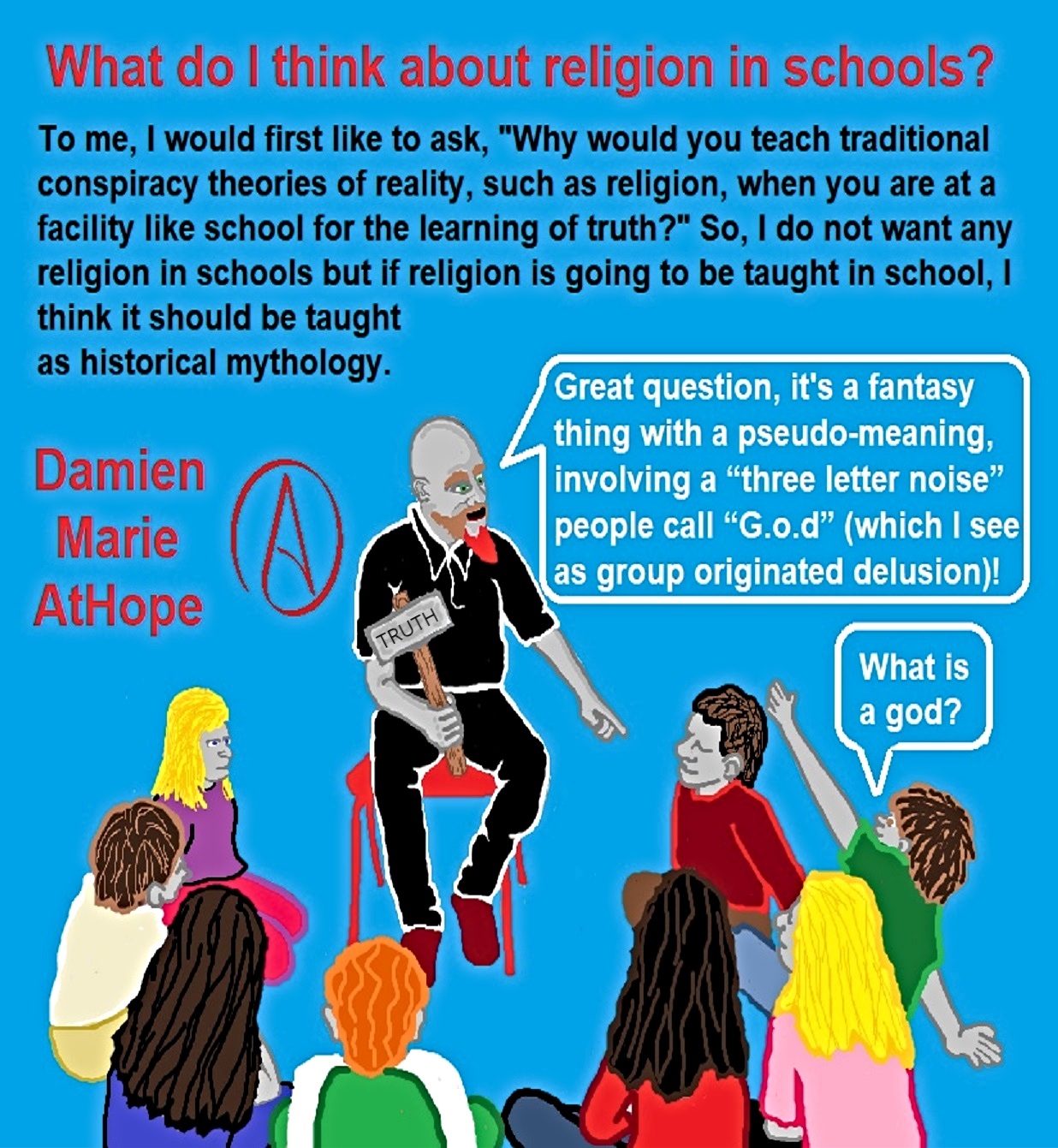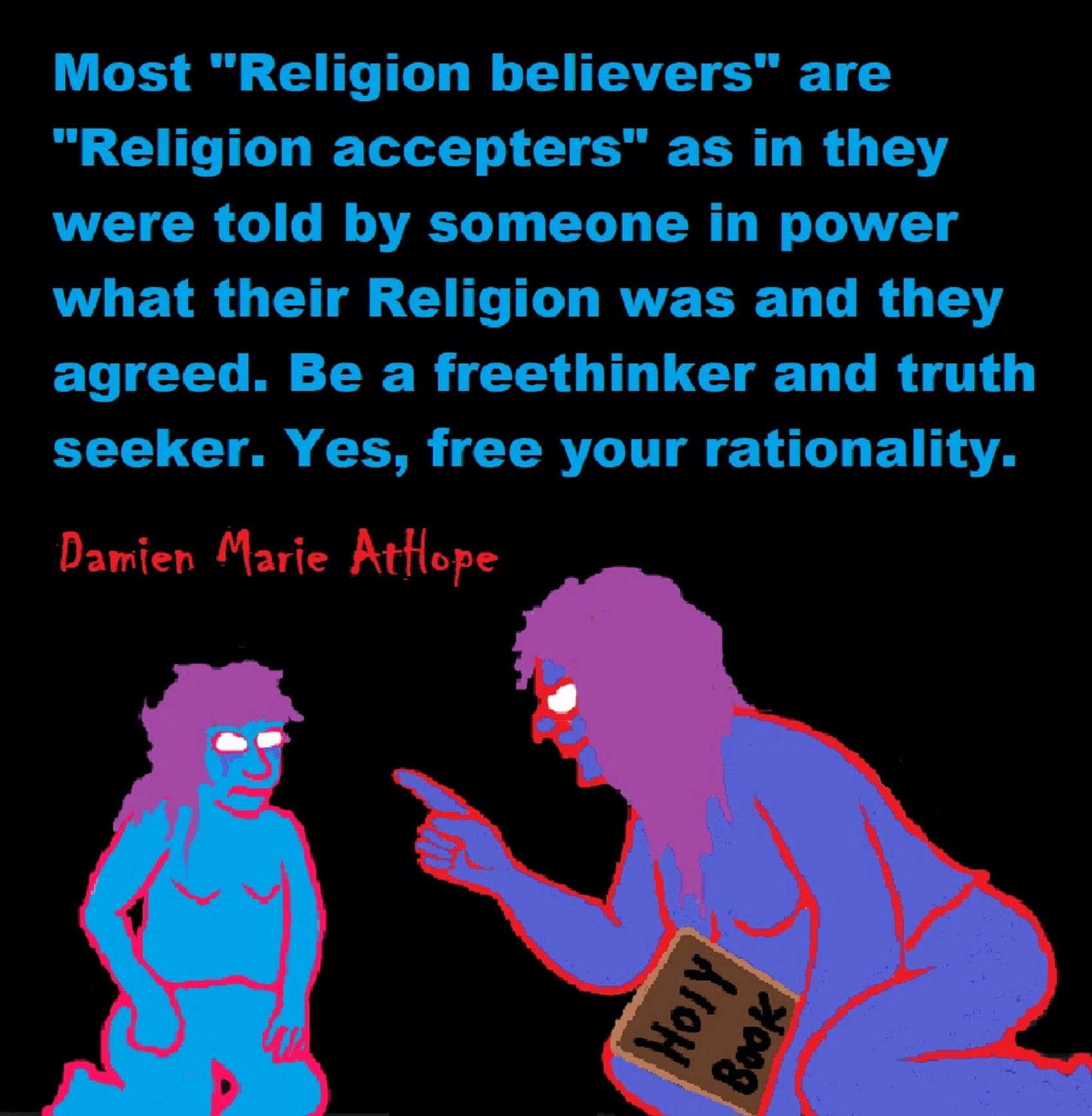
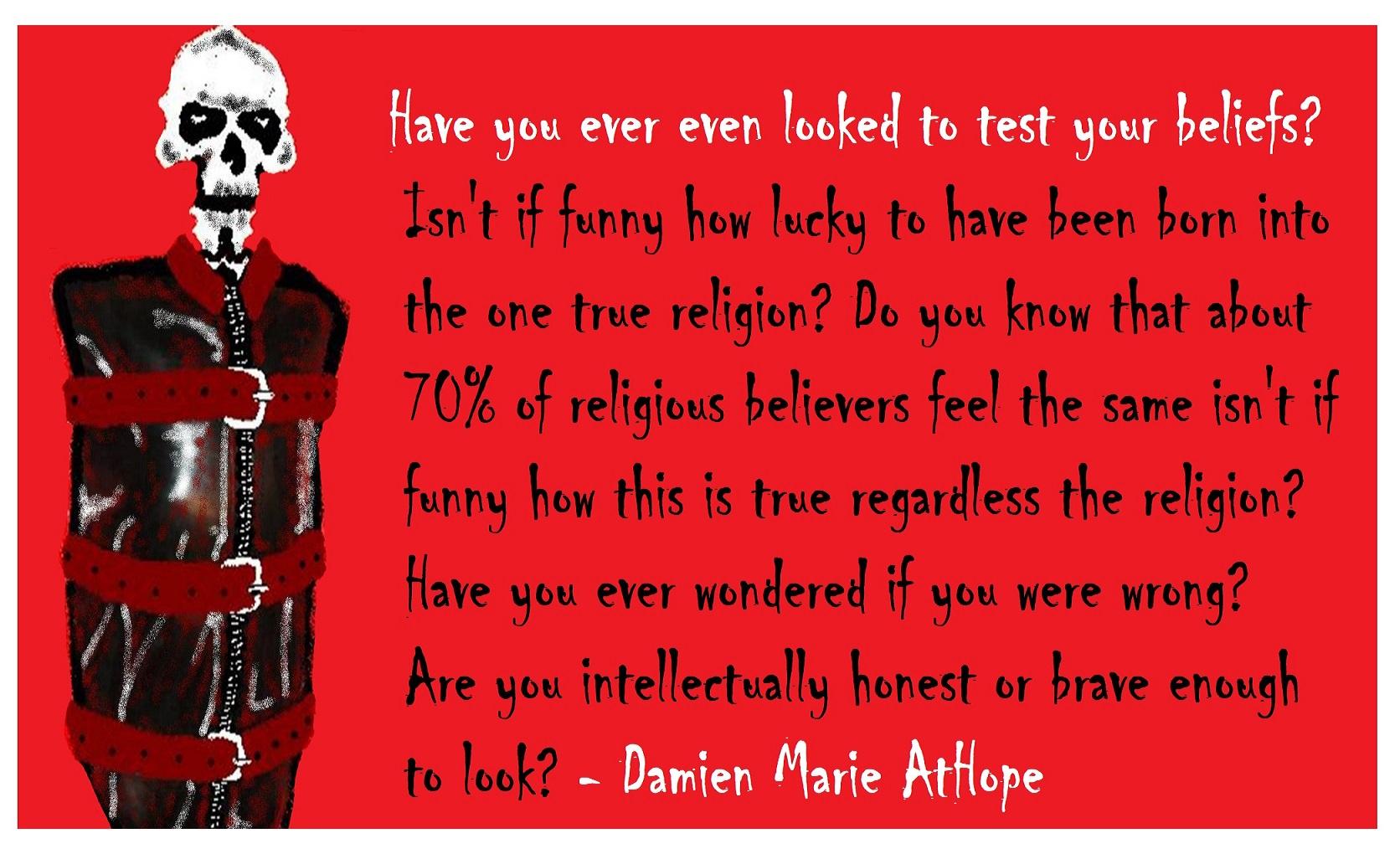
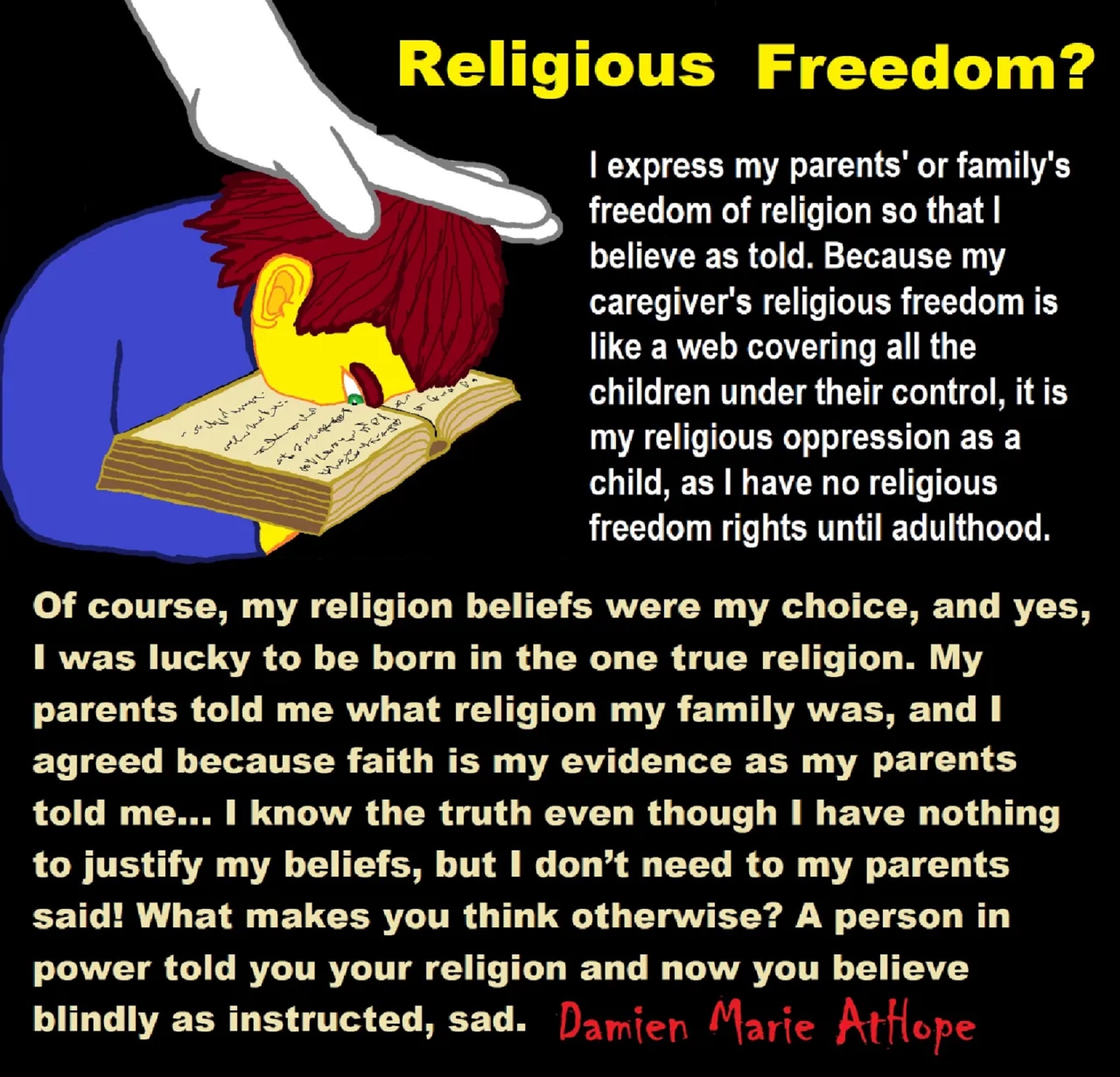
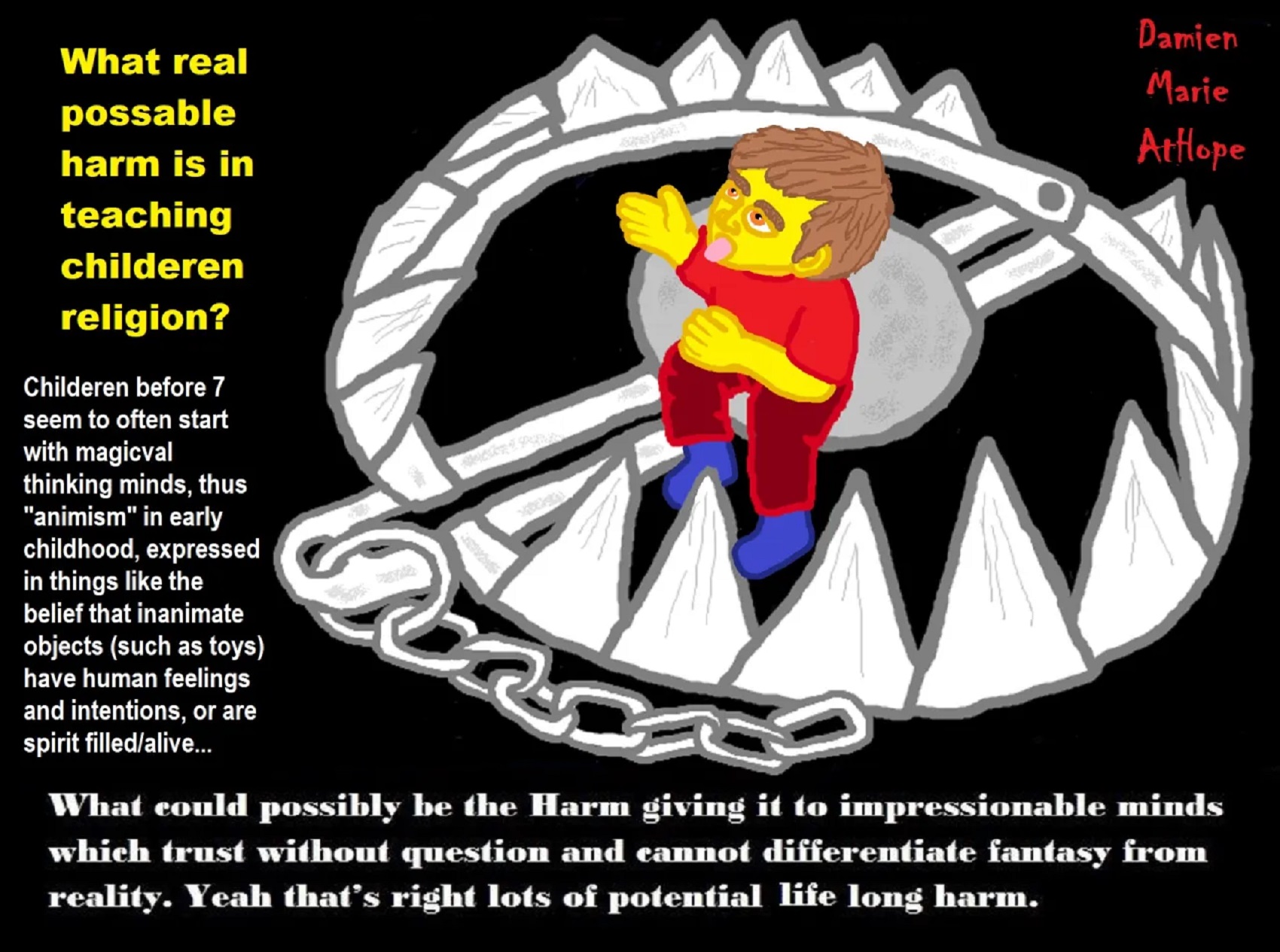
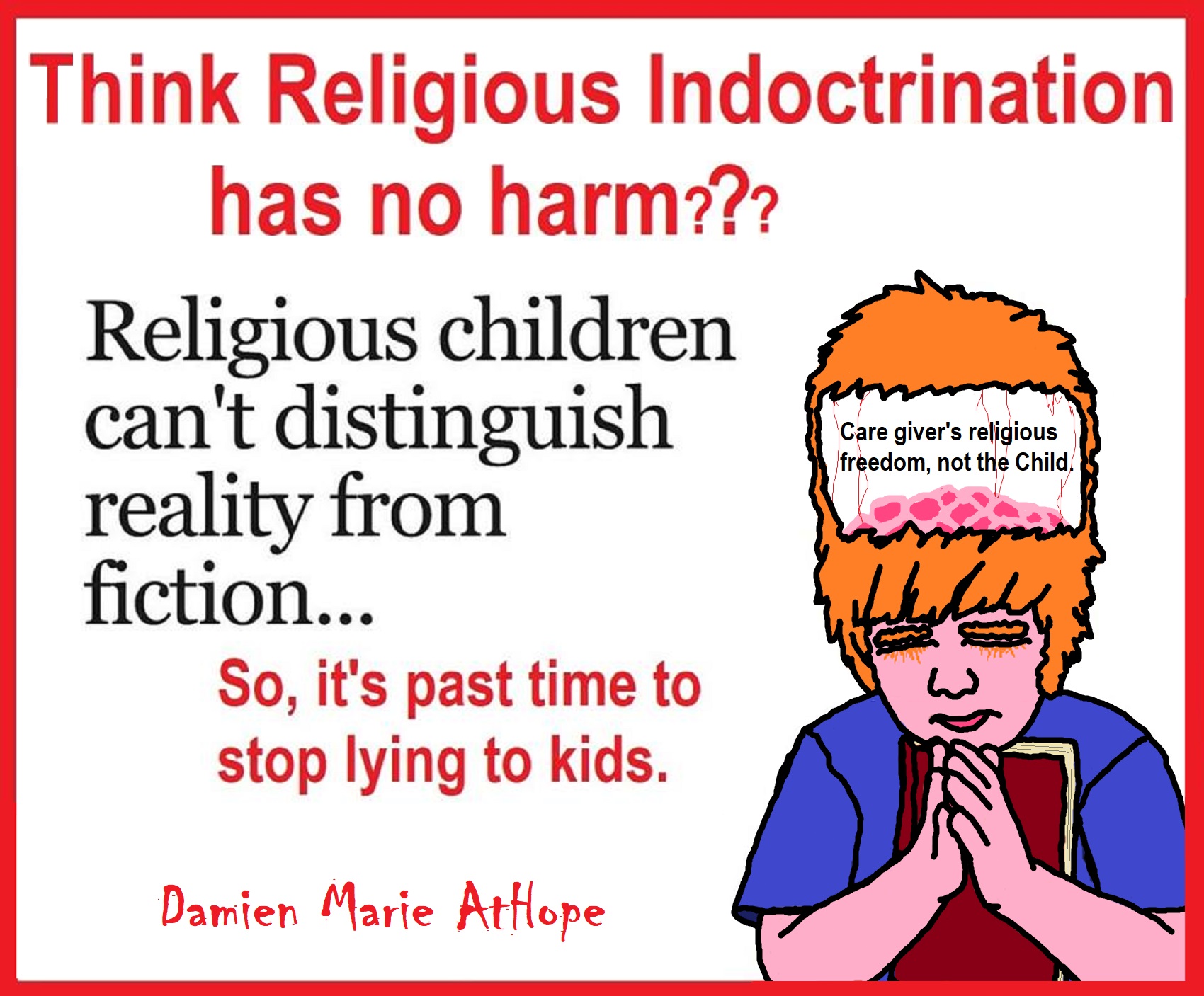
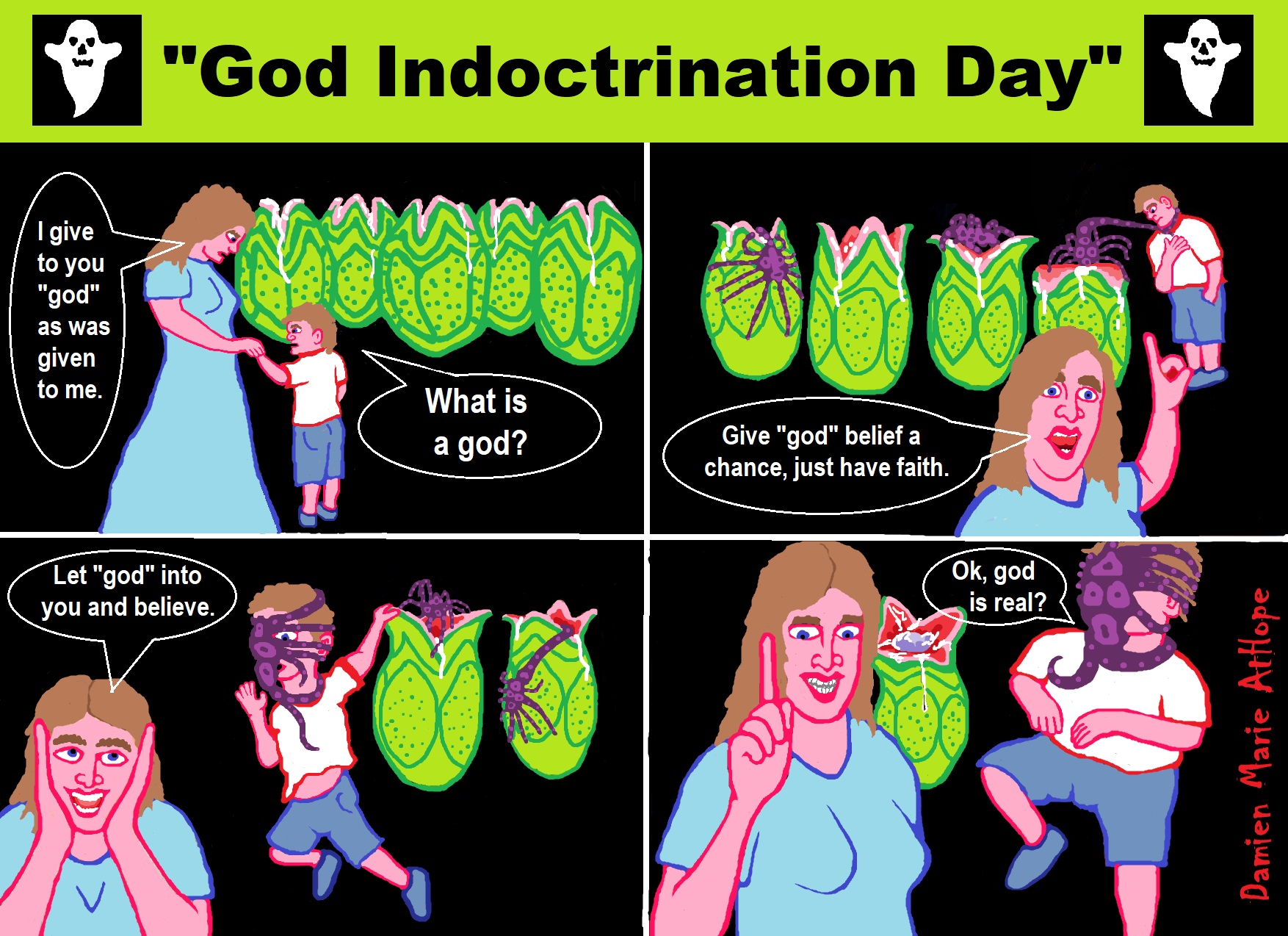
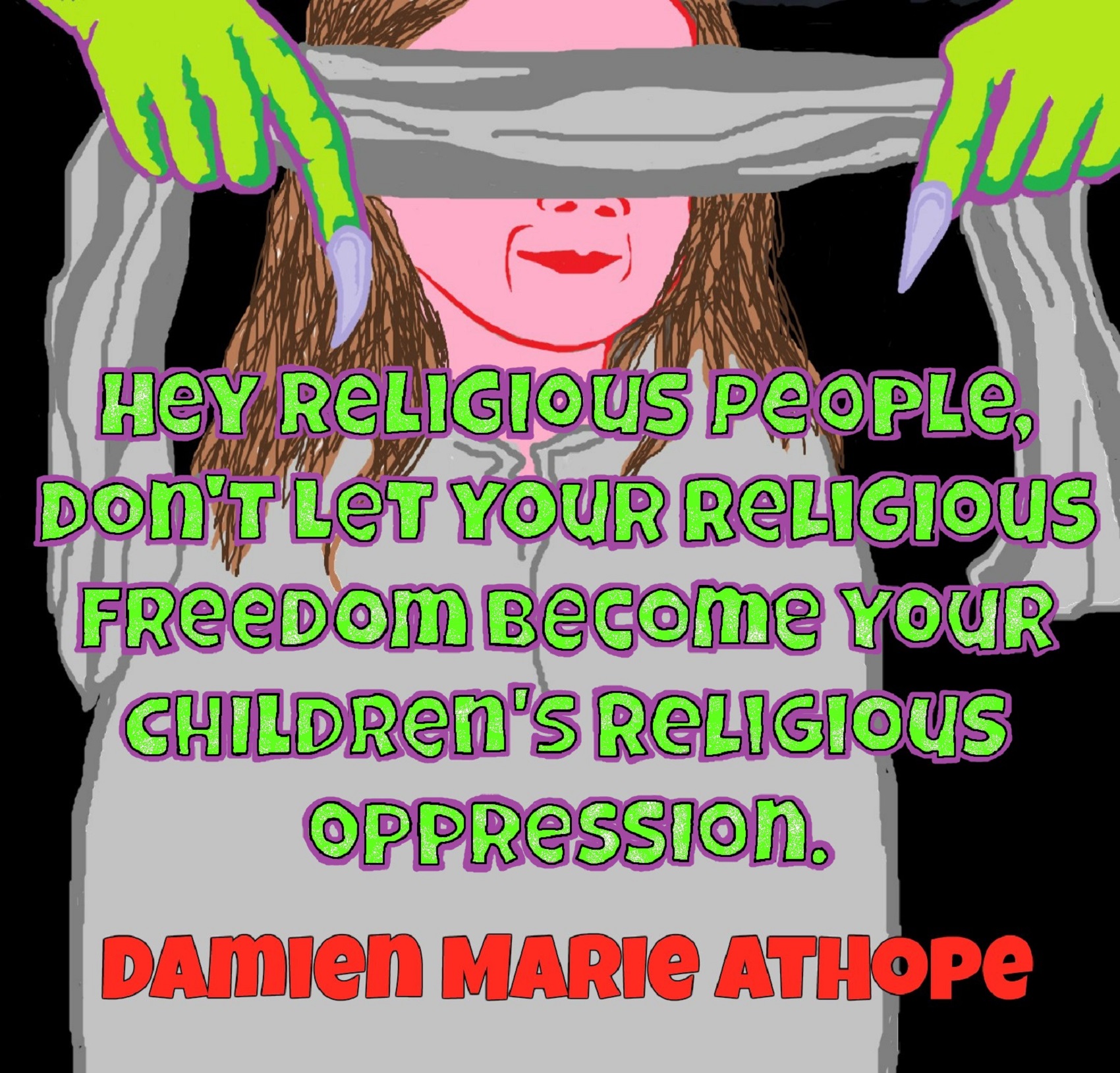
Evil of Religion: Get’em While They’re Young
Religion hurts children in many unrealized ways such as not knowing fantasy from reality. As a study highlights children exposed to religion have difficulty distinguishing fact from fiction. (to read more) To more deeply understand the problem of child indoctrination you must understand child development psychology toward animistic thinking. You may wonder what animistic thinking is. As it relates to psychology, animistic magical thinking, for instance, was a part of Jean Piaget’s theory of cognitive development. When children are not born believers but at ages under 8 do not yet understand concrete logic and cannot mentally grasp or analyze with critical thinking the world around them, they tend to creatively interject irrational beliefs seeing things, phenomenon, experiences or events in reality from a superstitious and/or supernaturalistic thinking mix of magical, animistic, or “nonnatural” conceptions of significance, causality, meaning or of beingness. The psychology expressed by animistic thinking is characterized by the child’s belief that inanimate objects, for a current example, dolls, possess desires, beliefs, and feelings in a similar way that the child does. A child is showing animistic thinking when they explain that a stuffed toy wants to talk to them, protect them, and loves them. Can you see why religions so desperately feel the need to push religion on children for it is at such an age they hold a natural inclination to non-natural beliefs? If no one were presented a religion until 18 years old, there would likely be little religion in the world. 1
Freedom of Religion, not Coercive Hereditary Religion
I am for letting kids decide their stance on religions for themselves. And as children can’t think without magical explanations until around 7 years old, it must be after then but I would like 18 years old before they feel they actually are choosing to freely decide or at least after reaching a teenage as is the standard in the Twenty-sixth Amendment to the United States Constitution which prohibits states and the federal government from denying the right to vote once a citizen reaches 18 years old. I think that both the issue of age of intellectual consent ability and the self-directed right of a child to make this choice freely is also an important child rights issue in both freedoms of speech and a citizen’s self-chosen right to religious liberty choices in the freedom of religion issue.
Moreover, in the United States, freedom of religion is a constitutionally protected right provided in the religion clauses of the First Amendment. So too religious civil liberties are guaranteed by the First Amendment is being violated when a parent is using force indoctrination on a child. removing the child’s right to freely choose or choose not to have a religion at all, as should be guaranteed them as an American citizen of the United States and generally speaking by being born in the United States or one of its territories the “acquisition” of citizenship has occurred thus one is a legal citizen at birth thus rights are deserved from birth, not after one leaves a parent as a young adult after 18 years old. Thus, to me, coercive hereditary religion is most often an expression of a rights violation against children who have an equal birthright citizenship involved under the religion clauses of the First Amendment just as the parents would if they are also citizens of the United States. However, I believe this or a similar standard was adopted all over the world and not just limited to the United States, freedom of religion and the first amendment freedom of speech.
And why do we so often error it thinking to wish on myths and not believe in scientific proven “godless-reality”, is because We are emotional beings who have a thinking strategy called reason we only sometimes use. Simply, We are not rational beings who have a bonding strategy called emotions we sometimes use. Atheists talk about gods and religions for the same reason doctors talk about cancer, they are looking for a cure or a firefighter talking about fires because they burn people and they care to stop them. We atheists too often feel a need to help the victim’s of mental slavery, held in the bondage that is the false beliefs of gods and the conspiracy theories of reality found in religions.
As an atheist, I feel more wonder than I did as a theist because I thought, “big deal” to any wonder I experienced, thinking god could do anything. So with such an unrealistic mindset, everything lost its wonder but it’s the opposite as an atheist. As a theist, the world was full of superstitions and supernatural magic possibilities and thus utilized thinking that was not in the real world. As an atheist all I have now is the real world, not that all atheists seem to get this, we all are in a real world devoid of magic anything, therefore, everything adds to my feeling of awe. There should be little debate with atheist acknowledging discernable reality compared to theists with non-reality claims. Yes, I have way more awe and wonder as an atheist than I ever had as a theist because as a theist anything was possible with god. Therefore, as a theist things where not that amazing. However, as an atheist grasping what an absolute accidental or how random things are, with a 95 to 99 % of all life ever existing on this planet went extinct. I am thoroughly amazed we are even here the evolved children of ancient exploded stars, likely born in galaxies born in supermassive black holes, it’s all amazing.
If the only rights you fight for are your own, then you have a lot to learn about the value of rights. Childhood Indoctrination is often the gateway drug, to a life of irrational magical thinking superstitions, like ghosts, gods, or guardian spirits. I am all for free thinking, if the evidence is there. Great, go down the rabbit hole but do not eat the rabbit shit offered as real; when its proof disappears like a mental mirage, gone in a poof magic as simple as the magical thinking that inspires all manner of flawed beliefs. Religion has been a reason for violence and harm and at times a promoter of peace. Science does not need to fill the gap of religion. We need to remove it as it was always an abstraction not a realistic thing to being with. Not one thing religion offers that is thought of as good that cannot be done by persons not following any religion. Atheist generally is simply life with religion removed, all its pseudo meaning as well as pseudoscience, pseudohistory, and pseudo-morality. We have real science, realistic history and can access real morality with a blend of philosophy, anthropology, psychology, sociology and cognitive science.
World, do you hear me now, because you were nothing but silent as I suffered extreme religious oppression and to this news, you simply spit in my face telling my religious freedom and all I can think is, no, you mean my parent’s religious freedom, which may I remind you is a violation of my religious freedom and was instead my religious oppression. Where are you now, while millions await this same fate if you keep doing nothing?
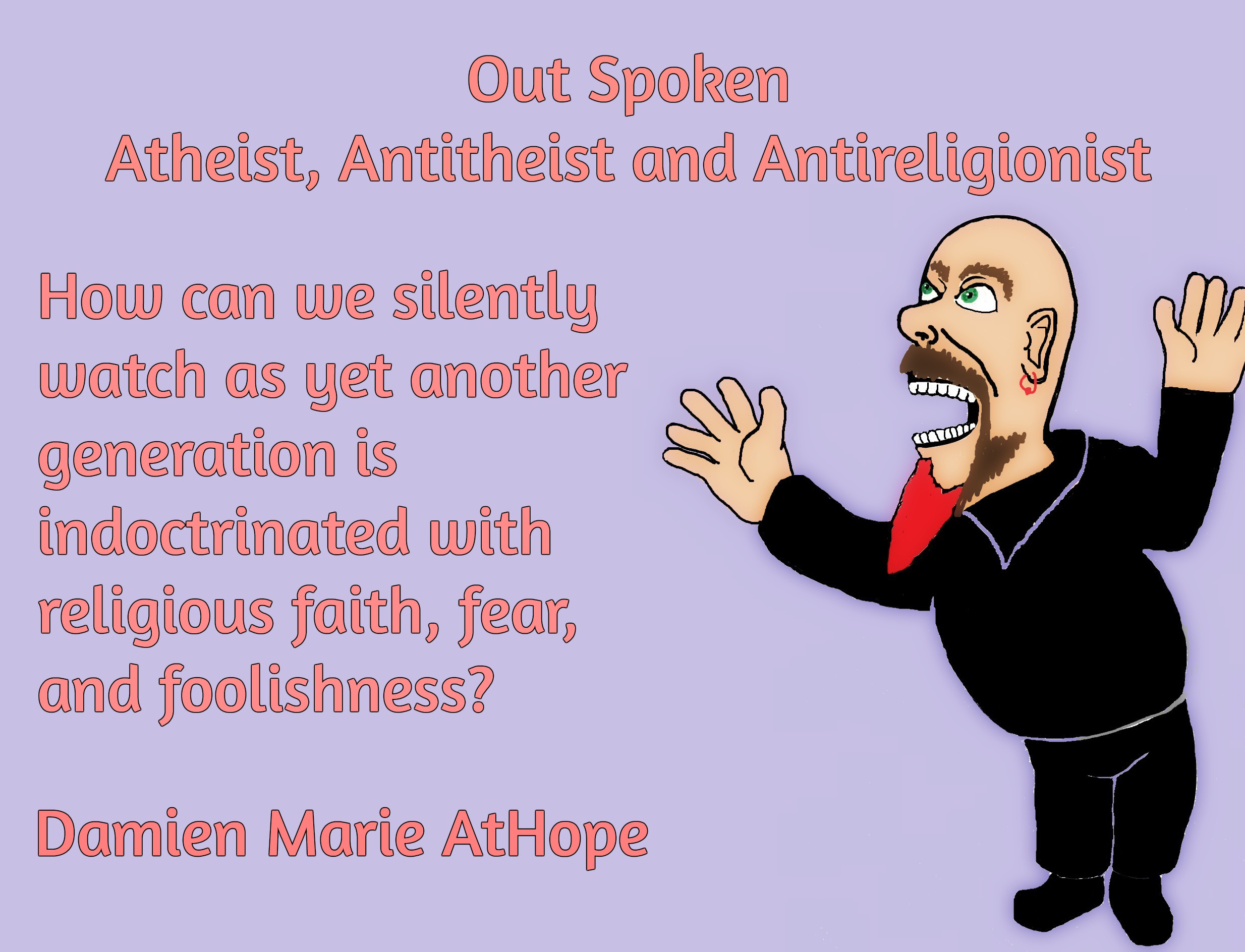
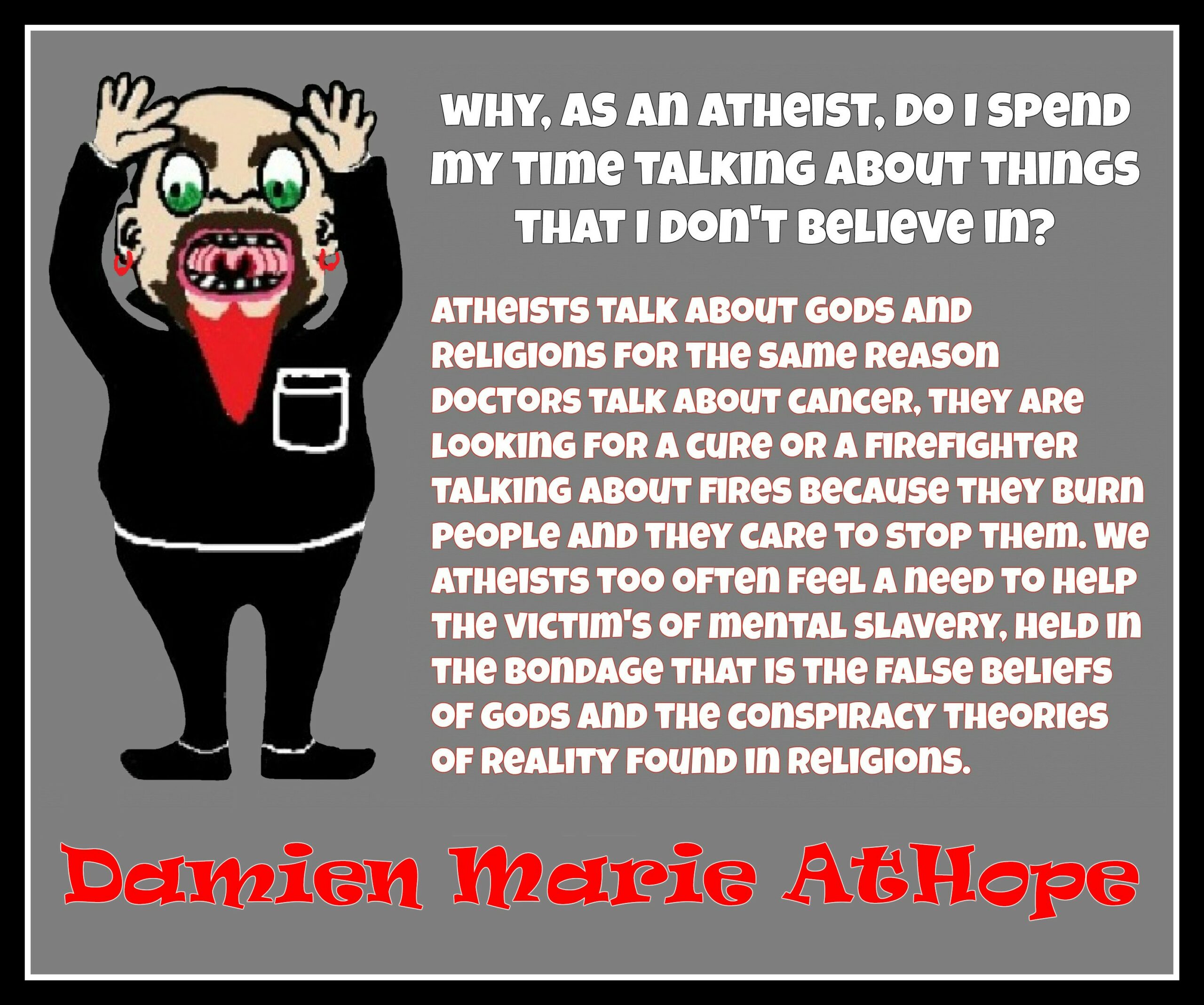
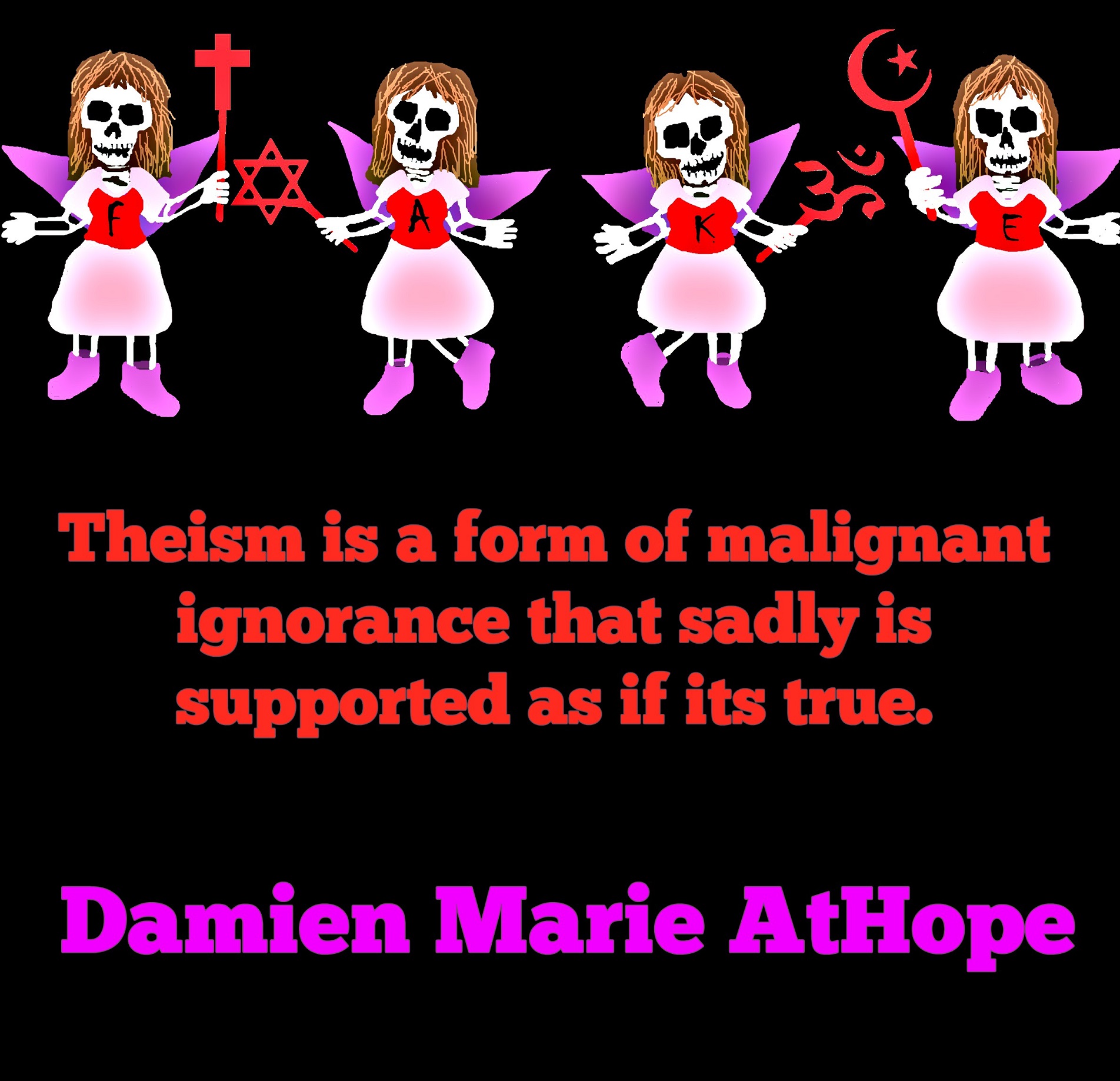

Do you truly think “Religious Belief” is only a matter of some personal choice?
Do you not see how coercive one’s world of choice is limited to the obvious hereditary belief, in most religious choices available to the child of religious parents or caregivers? Religion is more commonly like a family, culture, society, etc. available belief that limits the belief choices of the child and that is when “Religious Belief” is not only a matter of some personal choice and when it becomes hereditary faith, not because of the quality of its alleged facts or proposed truths but because everyone else important to the child believes similarly so they do as well simply mimicking authority beliefs handed to them. Because children are raised in religion rather than being presented all possible choices but rather one limited dogmatic brand of “Religious Belief” where children only have a choice of following the belief as instructed, and then personally claim the faith hereditary belief seen in the confirming to the belief they have held themselves all their lives. This is obvious in statements asked and answered by children claiming a faith they barely understand but they do understand that their family believes “this or that” faith, so they feel obligated to believe it too. While I do agree that “Religious Belief” should only be a matter of some personal choice, it rarely is… End Hereditary Religion!
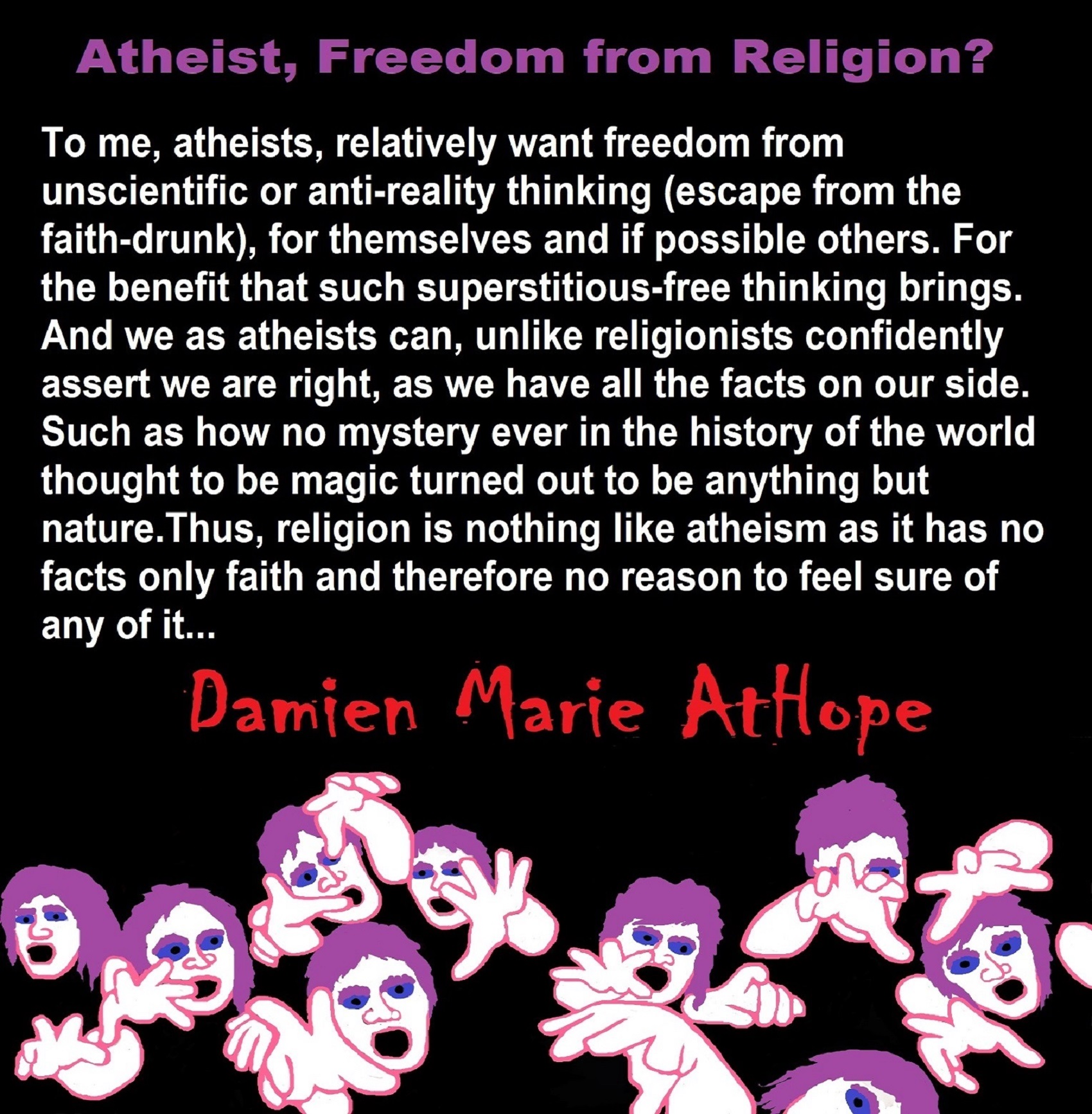
A child, to me, can no more choose a religion than a political party. In highly religious families a child is not allowed to believe or not believe freely or even thought all options then allowed to choose for themselves they are forced, controlled, and indoctrinated. Can the child reject the religion or choose its opposite and be supported and loved anyway? Not in almost any religion or believer parent or caretakers I have seen if it happens you are lying to say that is the norm. Kids are defenseless. To me, if a child wishes to believe or not believe by observing an adult they can I am against indoctrination. I feel the same as if they by watching adults wish to believe they are part of a political party but that in no way gives them a right to vote. I am dedicated to trying to promote the idea that religion is the choice of mature adults. It is subversive to the psychological, sociological, emotional, and personal mental sovereignty to excessively expose minors to religious indoctrination. May I not be a silent watcher as millions of children are subjugated almost before their birth let alone when they can understand “thought” and are forcibly coerced, compelled, constrained, and indoctrinated in the mental pollution that religion can be. And my main goal against religion is to fully stop as much as possible forced indoctrination, one could ask but then why do I challenge all adult’s faith? well, who do you think is doing the lying to children in the first place. End Hereditary religion, if it is a “belief” not forced thinking, let them have the equal right to choose to believe. Don’t children have rights? If the only rights you fight for are your own, then you have a lot to learn about the value of rights.
It seems ancient peoples had to survived amazing threats in a “dangerous universe (by superstition perceived as good and evil),” and human “immorality or imperfection of the soul” which was thought to affect the still living, leading to ancestor worship. This ancestor worship presumably led to the belief in supernatural beings, and then some of these were turned into the belief in gods. This feeble myth called gods were just a human conceived “made from nothing into something over and over, changing, again and again, taking on more as they evolve, all the while they are thought to be special,” but it is just supernatural animistic spirit-belief perceived as sacred.
Quick Evolution of Religion?
So, it all starts in a general way with Animism (theoretical belief in supernatural powers/spirits), then this is physically expressed in or with Totemism (theoretical belief in mythical relationship with powers/spirits through a totem item), which then enlists a full-time specific person to do this worship and believed interacting Shamanism (theoretical belief in access and influence with spirits through ritual), and then there is the further employment of myths and gods added to all the above giving you Paganism (often a lot more nature-based than most current top world religions, thus hinting to their close link to more ancient religious thinking it stems from). My hypothesis is expressed with an explanation of the building of a theatrical house (modern religions development).
A Sound Thinker: uses disciplined rationality
A Shallow Thinker: undisciplined, situational, sporadic, or limited thinking.
Psychological certainty and Epistemic certainty: Link
What is belief? (philosophy): Link
What is belief? (neuroscience): Link
What is belief? (Psychology): Link
Yes, We All Have Beliefs; But What Does That Mean?: Link
“The Hammer of Truth” Belief Navigation Process
“The Hammer of Truth” is my folk name for the Methodological use of Philosophy: Ontology, Epistemology, and Axiology questions to remove errors and add accuracy.”
Taking down god assertions in 123
1. What is a goD? (an ontology question)
2. How can one claim to know anything about a god? (an epistemology question)
3. How valid, good or worthy is a claim that one knows anything about a god? (an axiological question)
Understanding Religion Evolution:
- Animism (Africa: 100,000 years ago), (Animism | Britannica.com)
- Totemism (Europe: 50,000 years ago), (Totemism – Anthropology)
- Shamanism (Siberia: 30,000 years ago),(Shamanism | Britannica.com)
- Paganism (Turkey: 12,000 years ago), (BBC – Religion: Paganism)
- Progressed organized religion (Egypt: 5,000 years ago), (Prehistoric Egypt 40,000 years ago to The First Dynasty 5,150 years ago)
I argue for Atheism on scientific, archaeologically/anthropologically, philosophical, social/humanitarianism and prehistorical/historical grounds.
Archaeological, Scientific, & Philosophic grounds: Link
Prehistorical/historical grounds: Link
Social/humanitarianism grounds: Link
Oppose the Force of Hereditary religion!
All lovers of TRUE “Thinking Freedom” should oppose the force of hereditary religion!
If religion is about what is true, why do so many feel the need to force it?
Authority bias: “The tendency to attribute greater accuracy to the opinion of an authority figure (unrelated to its content) and be more influenced by that opinion.”
Illusion of truth effect: “The tendency of people to more often identify some statements as true solely because they have previously heard them (even if they cannot consciously remember having heard them), regardless of the actual validity of the statement. In other words, a person is more likely to believe a familiar statement than an unfamiliar one.”
Status quo bias: “The tendency to like things to stay relatively the same (see also loss aversion, endowment effect, and system justification).”
Anchoring bias: “The tendency to rely too heavily on the first piece of information offered (the “anchor”) when making decisions and anchoring also occurs when individuals use an initial piece of information to make subsequent judgments. Once an anchor is set, other judgments are made by adjusting away from that anchor, and there is a bias toward interpreting other information around the anchor. For example, the initial price offered for a religion sets the standard for the rest of the negotiations, so that prices lower than the initial price seem more reasonable even if they are still higher than what the car is really worth.
Confirmation bias: “The tendency to search for, interpret, focus on and remember information in a way that confirms one’s preconceptions.”
Post-purchase rationalization: “The tendency to persuade oneself through rational argument that a purchase was good value.”
Sorce: List of cognitive biases
Religious Trauma Syndrome: How Some Organized Religion Leads to Mental Health Problems.
I am Anti-Hereditary religion
To me, a general expression of what I see as hereditary religion is a parent telling a child their religion is “ABC-whatever” and forcing this unchosen belief by the child on the child until they to say they believe as told. You know, like almost all religious parents do all over the world, all the while claiming the religion and or god(s) are a chosen belief when it’s just agreement to ones in power they accept as their own with little thinking in general but most defiantly if said religion is pushed on the magical thinking minds of children under 7 who tend to appeal to animism thinking, hypothesis, and conclusions when they are unsure or being creative.
Marquis Amon: “A child can not understand religion until the age of 7 when the mind is developed enough to distinguish reality from fantasy. So before then, a child could not distinguish between any religions before then, so it can not be a part of any religion truly by choice until it can. Then there is the intellectual requirement of religion. It would take delving into religious history, linguistics, and archaeology and other sciences to make an informed choice. The legal rights of children are often neglected. There are arguments where private institutions can limit rights, through the use of rules. In school systems, the first amendment is often limited. However, even if we take this into consideration no child could be forced to choose a religion. The part of the first amendment that reads Congress shall make no law respecting or prohibiting an establishment of religion means legally and philosophically there is no justification requirement for having or lacking any religion. That one cannot enforce religion on another human being because it is legally non-binding. So hereditary religion is in violation of U.S. law. The tax-exempt status is not exclusive to churches, there is no legal establishment of what a religion is in the U.S. nor can there be legal affiliation for that reason, so religion rightfully is to any U.S. citizen freely in this country. Child are citizens, they have rights, those rights should be protected.” – Marquis Amon
- How to best Help change the current value of Religion Freedom Rights over Child Rights?
- Religion harm and a way to stop it’s Rights Violations?
- Child Religion Freedom Rights Violations?
- Religion Freedom Rights vs. Child Rights?
Religious Trauma Syndrome:
How Some Organized Religion Leads to Mental Health Problems
At age sixteen I began what would be a four-year struggle with bulimia. When the symptoms started, I turned in desperation to adults who knew more than I did about how to stop shameful behavior—my Bible study leader and a visiting youth minister. “If you ask anything in faith, believing,” they said. “It will be done.” I knew they were quoting the Word of God. We prayed together, and I went home confident that God had heard my prayers. But my horrible compulsions didn’t go away. By the fall of my sophomore year in college, I was desperate and depressed enough that I made a suicide attempt. The problem wasn’t just the bulimia. I was convinced by then that I was a complete spiritual failure. My college counseling department had offered to get me real help (which they later did). But to my mind, at that point, such help couldn’t fix the core problem: I was a failure in the eyes of God. It would be years before I understood that my inability to heal bulimia through the mechanisms offered by biblical Christianity was not a function of my own spiritual deficiency but deficiencies in Evangelical religion itself. Dr. Marlene Winell is a human development consultant in the San Francisco Area. She is also the daughter of Pentecostal missionaries. This combination has given her work an unusual focus. For the past twenty years, she has counseled men and women in recovery from various forms of fundamentalist religion including the Assemblies of God denomination in which she was raised. Winell is the author of Leaving the Fold – A Guide for Former Fundamentalists and Others Leaving their Religion, written during her years of private practice in psychology. Over the years, Winell has provided assistance to clients whose religious experiences were even more damaging than mine. Some of them are people whose psychological symptoms weren’t just exacerbated by their religion, but actually caused by it. Two years ago, Winell made waves by formally labeling what she calls “Religious Trauma Syndrome” (RTS) and beginning to write and speak on the subject for professional audiences. When the British Association of Behavioral and Cognitive Psychologists published a series of articles on the topic, members of a Christian counseling association protested what they called excessive attention to a “relatively niche topic.” One commenter said, “A religion, faith or book cannot be abuse but the people interpreting can make anything abusive.” Is toxic religion simply misinterpretation? What is religious trauma? Why does Winell believe religious trauma merits its own diagnostic label?
Let’s start this interview with the basics. What exactly is religious trauma syndrome?
Winell: Religious trauma syndrome (RTS) is a set of symptoms and characteristics that tend to go together and which are related to harmful experiences with religion. They are the result of two things: immersion in a controlling religion and the secondary impact of leaving a religious group. The RTS label provides a name and description that affected people often recognize immediately. Many other people are surprised by the idea of RTS, because in our culture it is generally assumed that religion is benign or good for you. Just like telling kids about Santa Claus and letting them work out their beliefs later, people see no harm in teaching religion to children. But in reality, religious teachings and practices sometimes cause serious mental health damage. The public is somewhat familiar with sexual and physical abuse in a religious context. As Journalist Janet Heimlich has documented in, Breaking Their Will, Bible-based religious groups that emphasize patriarchal authority in family structure and use harsh parenting methods can be destructive. But the problem isn’t just physical and sexual abuse. Emotional and mental treatment in authoritarian religious groups also can be damaging because of 1) toxic teachings like eternal damnation or original sin 2) religious practices or mindset, such as punishment, black and white thinking, or sexual guilt, and 3) neglect that prevents a person from having the information or opportunities to develop normally.
Can you give me an example of RTS from your consulting practice?
Winell: I can give you many. One of the symptom clusters is around fear and anxiety. People indoctrinated into fundamentalist Christianity as small children sometimes have memories of being terrified by images of hell and apocalypse before their brains could begin to make sense of such ideas. Some survivors, who I prefer to call “reclaimers,” have flashbacks, panic attacks, or nightmares in adulthood even when they intellectually no longer believe the theology. One client of mine, who during the day functioned well as a professional, struggled with intense fear many nights. She said, I was afraid I was going to hell. I was afraid I was doing something really wrong. I was completely out of control. I sometimes would wake up in the night and start screaming, thrashing my arms, trying to rid myself of what I was feeling. I’d walk around the house trying to think and calm myself down, in the middle of the night, trying to do some self-talk, but I felt like it was just something that – the fear and anxiety was taking over my life. Or consider this comment, which refers to a film used by evangelicals to warn about the horrors of the “end times” for nonbelievers. I was taken to see the film “A Thief In The Night”. WOW. I am in shock to learn that many other people suffered the same traumas I lived with because of this film. A few days or weeks after the film viewing, I came into the house and mom wasn’t there. I stood there screaming in terror. When I stopped screaming, I began making my plan: Who my Christian neighbors were, who’s house to break into to get money and food. I was 12 yrs old and was preparing for Armageddon alone. In addition to anxiety, RTS can include depression, cognitive difficulties, and problems with social functioning. In fundamentalist Christianity, the individual is considered depraved and in need of salvation. A core message is “You are bad and wrong and deserve to die.” (The wages of sin is death.) This gets taught to millions of children through organizations like Child Evangelism Fellowship and there is a group organized to oppose their incursion into public schools. I’ve had clients who remember being distraught when given a vivid bloody image of Jesus paying the ultimate price for their sins. Decades later they sit telling me that they can’t manage to find any self-worth. After twenty-seven years of trying to live a perfect life, I failed. . . I was ashamed of myself all day long. My mind battling with itself with no relief. . . I always believed everything that I was taught but I thought that I was not approved by God. I thought that basically I, too, would die at Armageddon. I’ve spent literally years injuring myself, cutting and burning my arms, taking overdoses and starving myself, to punish myself so that God doesn’t have to punish me. It’s taken me years to feel deserving of anything good. Born-again Christianity and devout Catholicism tell people they are weak and dependent, calling on phrases like “lean not unto your own understanding” or “trust and obey.” People who internalize these messages can suffer from learned helplessness. I’ll give you an example from a client who had little decision-making ability after living his entire life devoted to following the “will of God.” The words here don’t convey the depth of his despair. I have an awful time making decisions in general. Like I can’t, you know, wake up in the morning, “What am I going to do today?” Like I don’t even know where to start. You know all the things I thought I might be doing are gone and I’m not sure I should even try to have a career; essentially I babysit my four-year-old all day. Authoritarian religious groups are subcultures where conformity is required in order to belong. Thus if you dare to leave the religion, you risk losing your entire support system as well. I lost all my friends. I lost my close ties to family. Now I’m losing my country. I’ve lost so much because of this malignant religion and I am angry and sad to my very core. . . I have tried hard to make new friends, but I have failed miserably. . . I am very lonely. Leaving a religion, after total immersion, can cause a complete upheaval of a person’s construction of reality, including the self, other people, life, and the future. People unfamiliar with this situation, including therapists, have trouble appreciating the sheer terror it can create. My form of religion was very strongly entrenched and anchored deeply in my heart. It is hard to describe how fully my religion informed, infused, and influenced my entire worldview. My first steps out of fundamentalism were profoundly frightening and I had frequent thoughts of suicide. Now I’m way past that but I still haven’t quite found “my place in the universe. Even for a person who was not so entrenched, leaving one’s religion can be a stressful and significant transition.
Many people seem to walk away from their religion easily, without really looking back. What is different about the clientele you work with?
Winell: Religious groups that are highly controlling, teach fear about the world, and keep members sheltered and ill-equipped to function in society are harder to leave easily. The difficulty seems to be greater if the person was born and raised in the religion rather than joining as an adult convert. This is because they have no frame of reference – no other “self” or way of “being in the world.” A common personality type is a person who is deeply emotional and thoughtful and who tends to throw themselves wholeheartedly into their endeavors. “True believers” who then lose their faith feel more anger and depression and grief than those who simply went to church on Sunday.
Aren’t these just people who would be depressed, anxious, or obsessive anyways?
Winell: Not at all. If my observation is correct, these are people who are intense and involved and caring. They hang on to the religion longer than those who simply “walk away” because they try to make it work even when they have doubts. Sometimes this is out of fear, but often it is out of devotion. These are people for whom ethics, integrity and compassion matter a great deal. I find that when they get better and rebuild their lives, they are wonderfully creative and energetic about new things.
In your mind, how is RTS different from Post-Traumatic Stress Disorder?
Winell: RTS is a specific set of symptoms and characteristics that are connected with harmful religious experience, not just any trauma. This is crucial to understanding the condition and any kind of self-help or treatment. (More details about this can be found on my Journey Free website and discussed in my talk at the Texas Freethought Convention.) Another difference is the social context, which is extremely different from other traumas or forms of abuse. When someone is recovering from domestic abuse, for example, other people understand and support the need to leave and recover. They don’t question it as a matter of interpretation, and they don’t send the person back for more. But this is exactly what happens to many former believers who seek counseling. If a provider doesn’t understand the source of the symptoms, he or she may send a client for pastoral counseling, or to AA, or even to another church. One reclaimer expressed her frustration this way: Include physically-abusive parents who quote “Spare the rod and spoil the child” as literally as you can imagine and you have one fucked-up soul: an unloved, rejected, traumatized toddler in the body of an adult. I’m simply a broken spirit in an empty shell. But wait…That’s not enough!? There’s also the expectation by everyone in society that we victims should celebrate this with our perpetrators every Christmas and Easter!! Just like disorders such as autism or bulimia, giving RTS a real name has important advantages. People who are suffering find that having a label for their experience helps them feel less alone and guilty. Some have written to me to express their relief: There’s actually a name for it! I was brainwashed from birth and wasted 25 years of my life serving Him! I’ve since been out of my religion for several years now, but I cannot shake the haunting fear of hell and feel absolutely doomed. I’m now socially inept, unemployable, and the only way I can have sex is to pay for it. Labeling RTS encourages professionals to study it more carefully, develop treatments, and offer training. Hopefully, we can even work on prevention.
What do you see as the difference between a religion that causes trauma and religion that doesn’t?
Winell: Religion causes trauma when it is highly controlling and prevents people from thinking for themselves and trusting their own feelings. Groups that demand obedience and conformity produce fear, not love and growth. With the constant judgment of self and others, people become alienated from themselves, each other, and the world. Religion in its worst forms causes separation. Conversely, groups that connect people and promote self-knowledge and personal growth can be said to be healthy. The book, Healthy Religion, describes these traits. Such groups put high value on respecting differences, and members feel empowered as individuals. They provide social support, a place for events and rites of passage, exchange of ideas, inspiration, opportunities for service, and connection to social causes. They encourage spiritual practices that promote health like meditation or principles for living like the golden rule. More and more, nontheists are asking how they can create similar spiritual communities without the supernaturalism. An atheist congregation in London launched this year and has received over 200 inquiries from people wanting to replicate their model.
Some people say that terms like “recovery from religion” and “religious trauma syndrome” are just atheist attempts to pathologize religious belief.
Winell: Mental health professionals have enough to do without going out looking for new pathology. I never set out looking for a “niche topic,” and certainly not religious trauma syndrome. I originally wrote a paper for a conference of the American Psychological Association and thought that would be the end of it. Since then, I have tried to move on to other things several times, but this work has simply grown. In my opinion, we are simply, as a culture, becoming aware of religious trauma. More and more people are leaving religion, as seen by polls showing that the “religiously unaffiliated” have increased in the last five years from just over 15% to just under 20% of all U.S. adults. It’s no wonder the internet is exploding with websites for former believers from all religions, providing forums for people to support each other. The huge population of people “leaving the fold” includes a subset at risk for RTS, and more people are talking about it and seeking help. For example, there are thousands of former Mormons, and I was asked to speak about RTS at an Exmormon Foundation conference. I facilitate an international support group online called Release and Reclaim which has monthly conference calls. An organization called Recovery from Religion, helps people start self-help meet-up groups. Saying that someone is trying to pathologize authoritarian religion is like saying someone pathologized eating disorders by naming them. Before that, they were healthy? No, before that we weren’t noticing. People were suffering, thought they were alone, and blamed themselves. Professionals had no awareness or training. This is the situation of RTS today. Authoritarian religion is already pathological, and leaving a high-control group can be traumatic. People are already suffering. They need to be recognized and helped.
Do you want what is true or want what you believe without concern for what may actually be true?


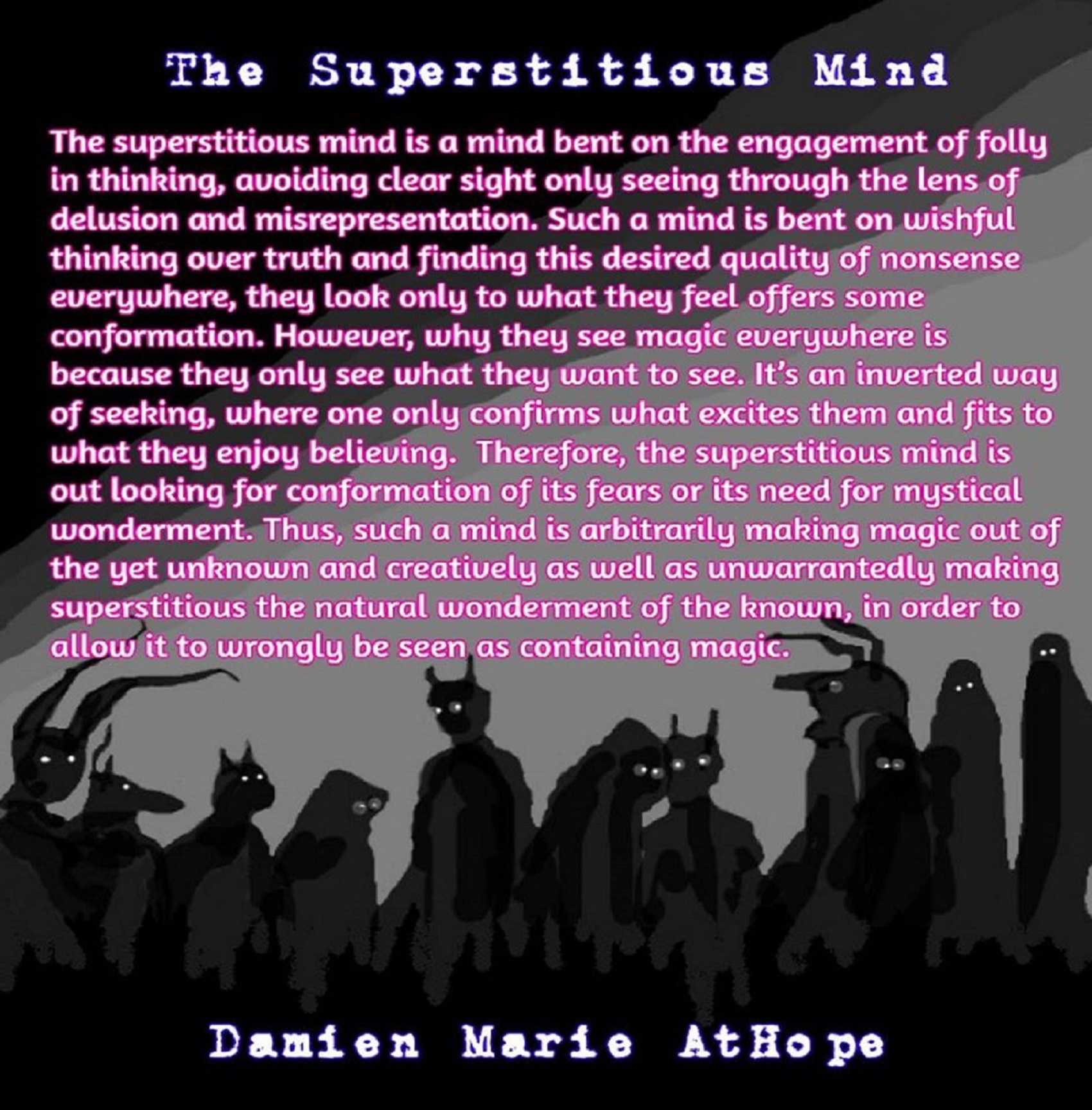
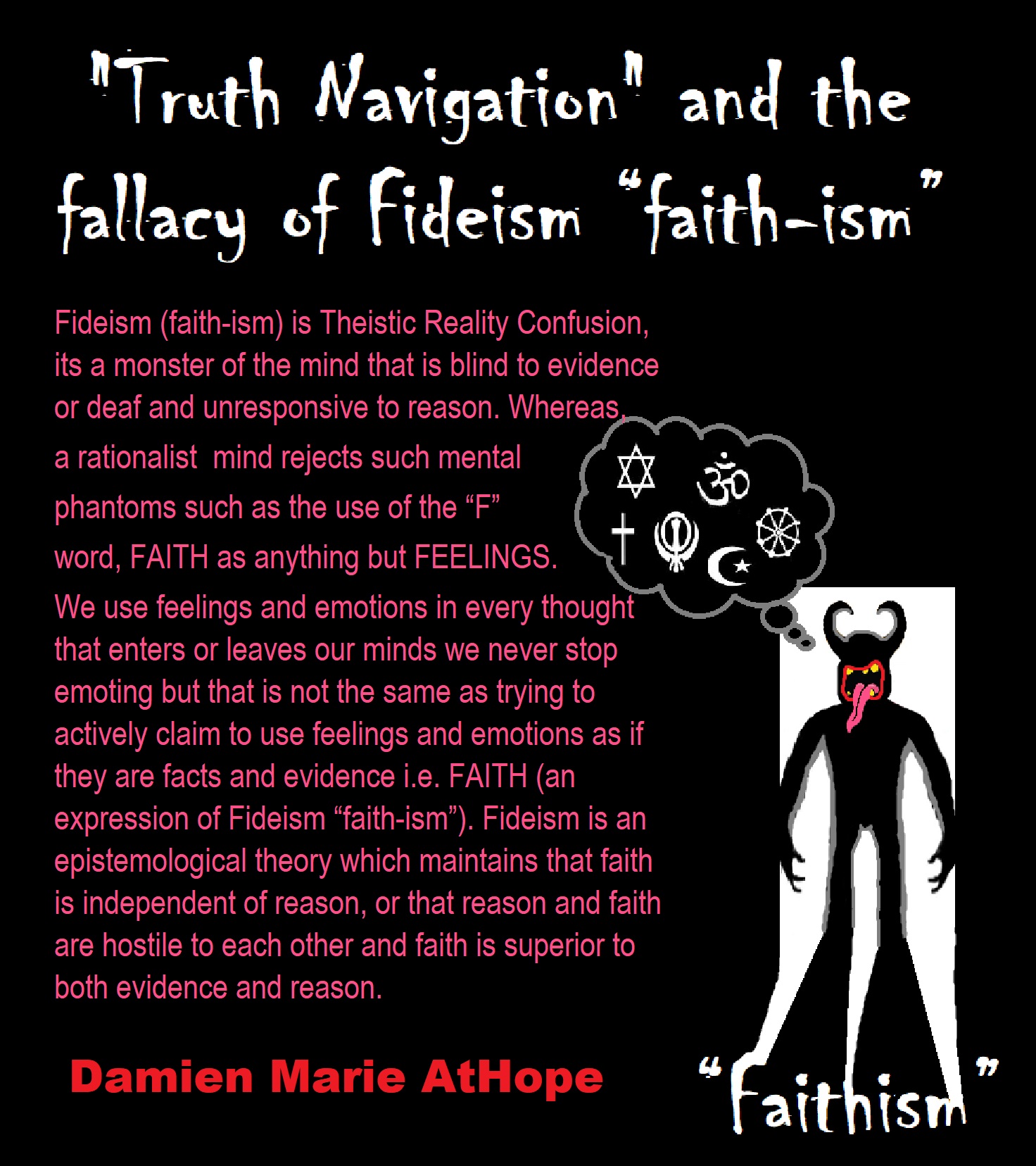
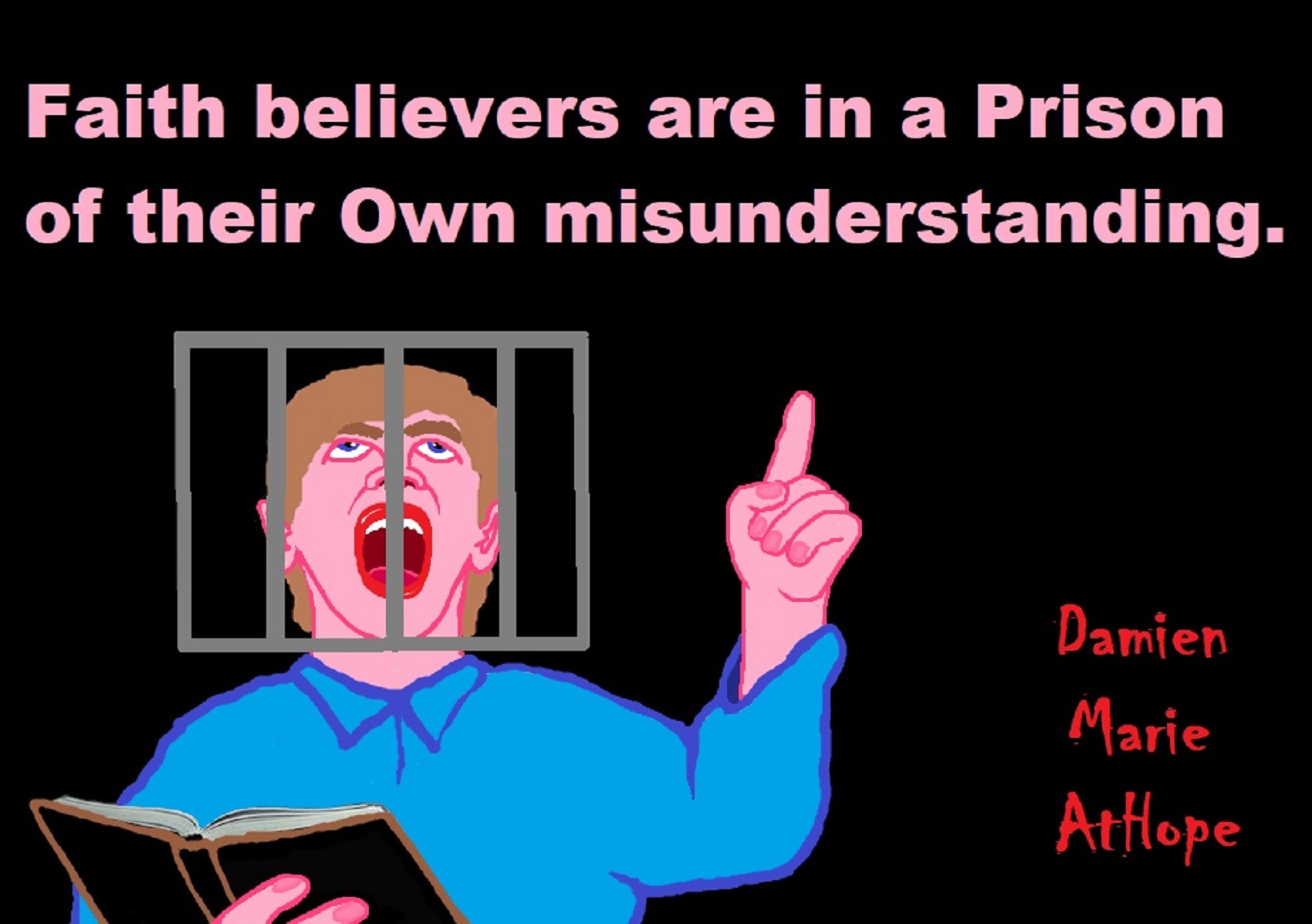
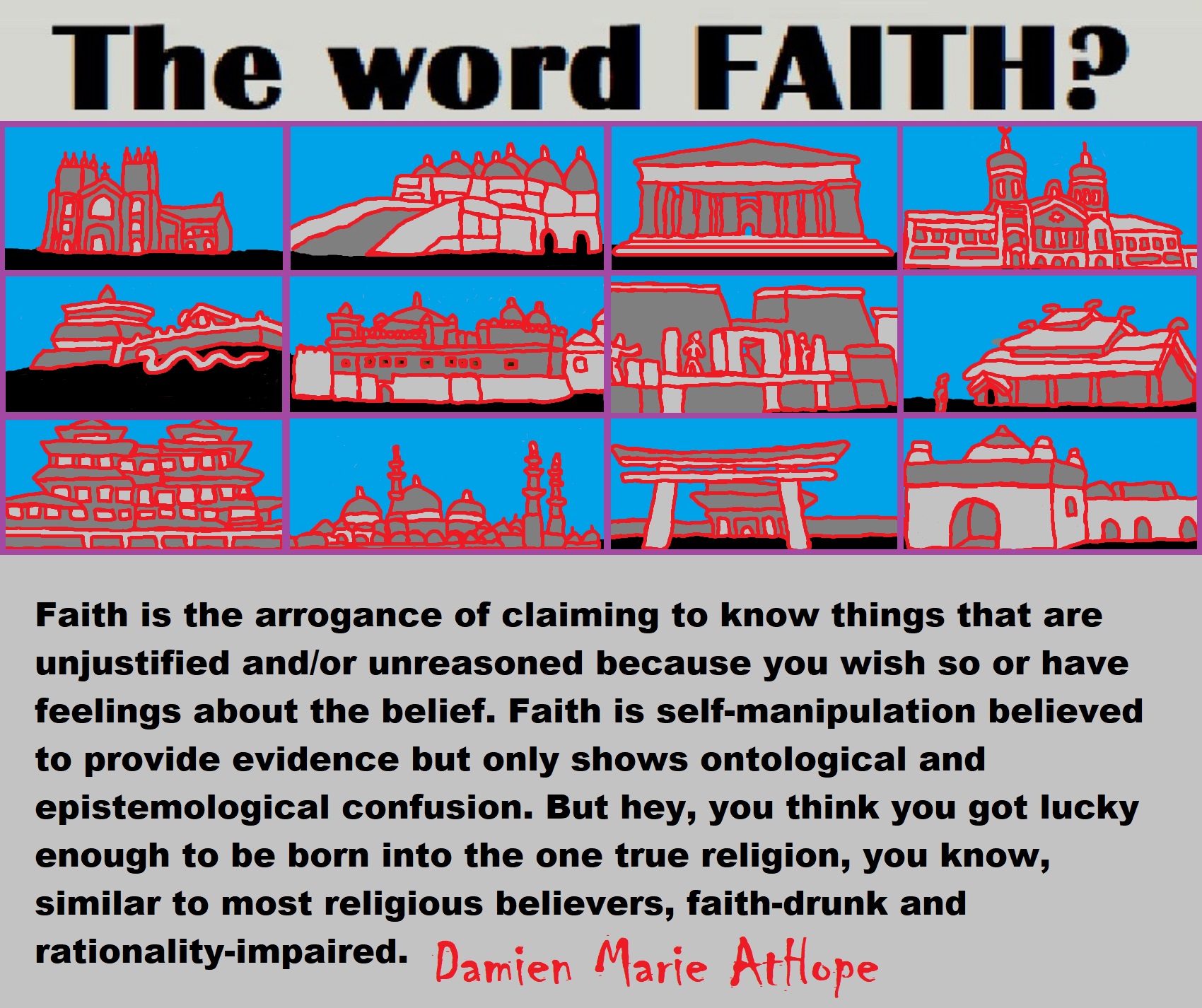
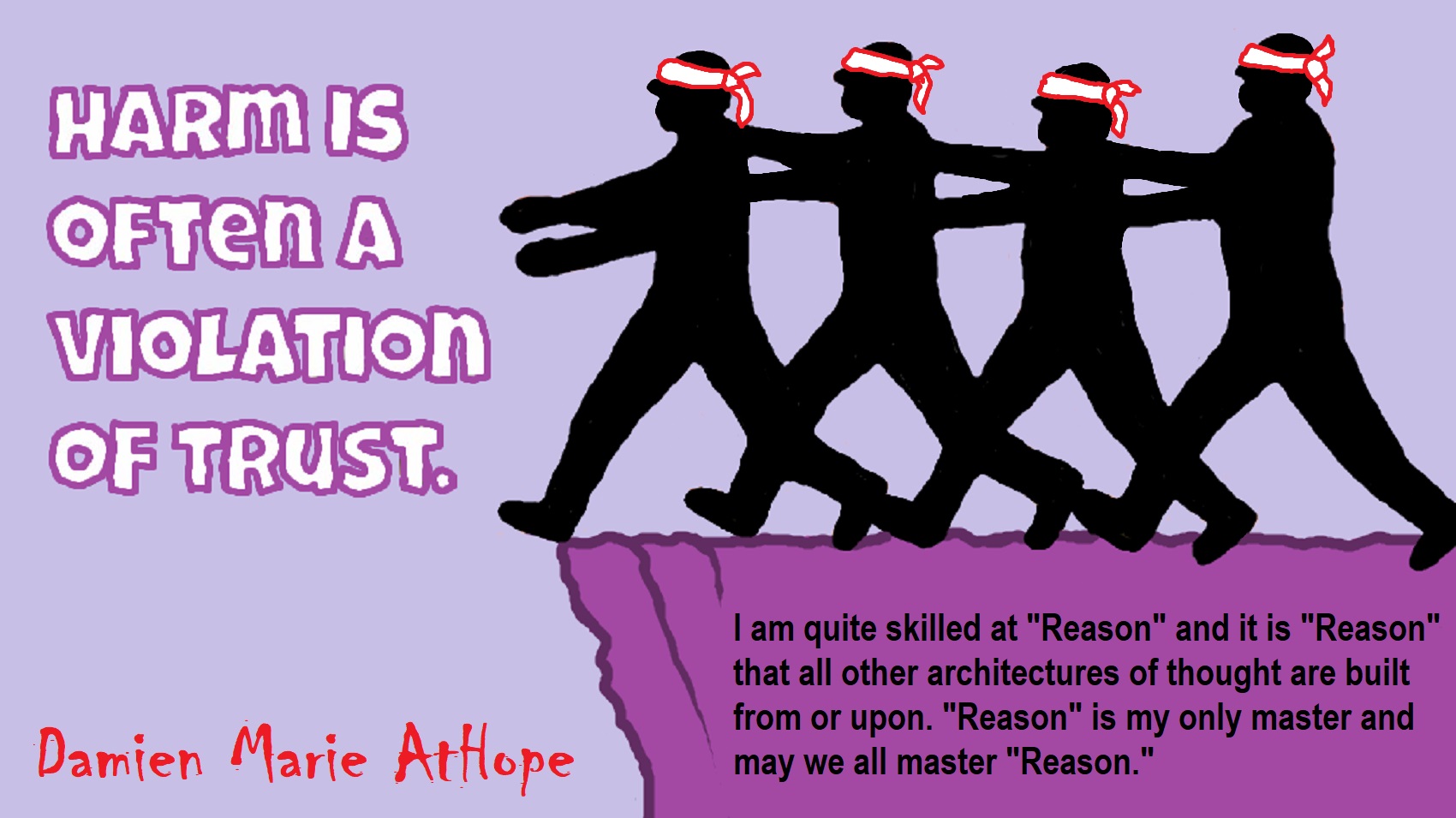
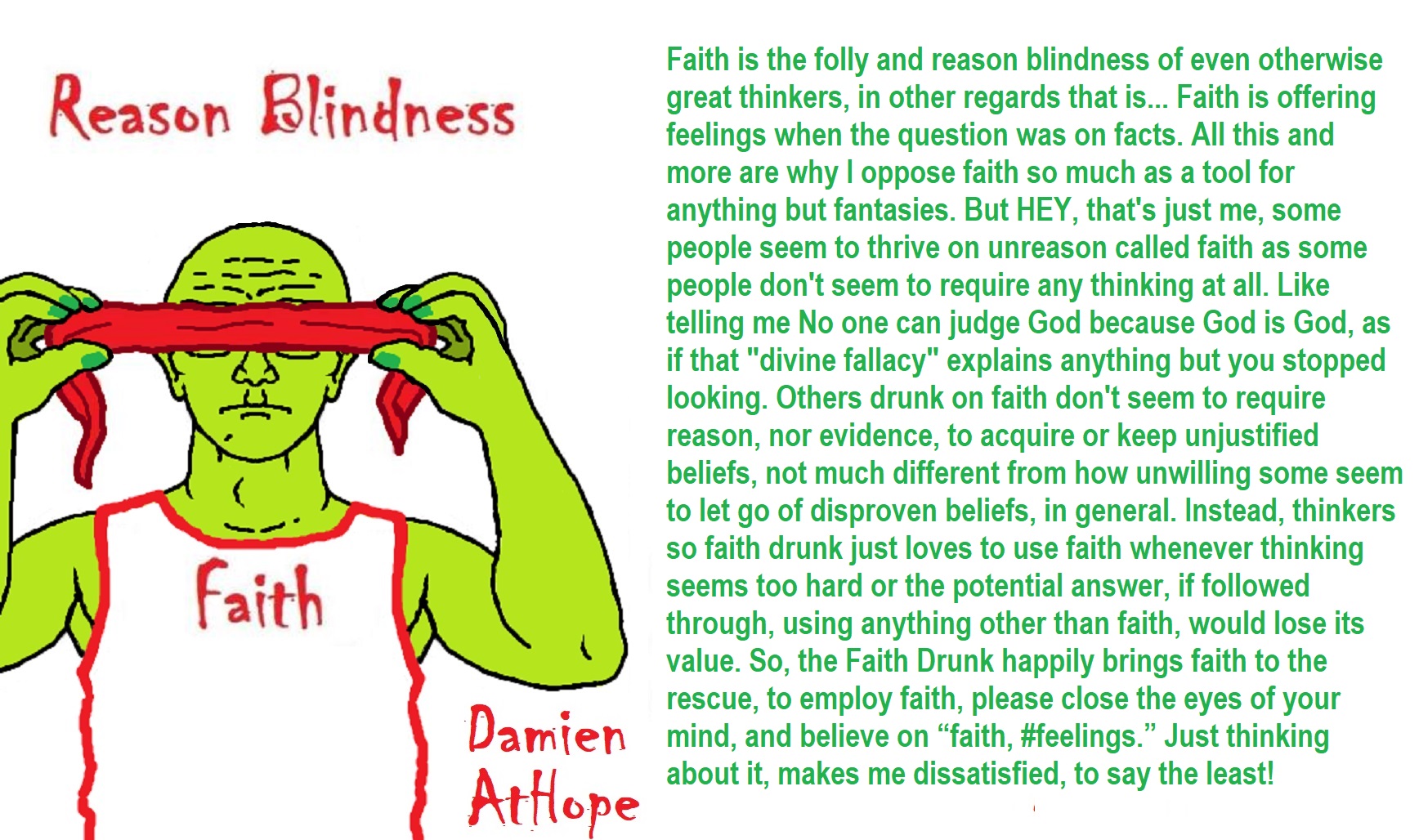
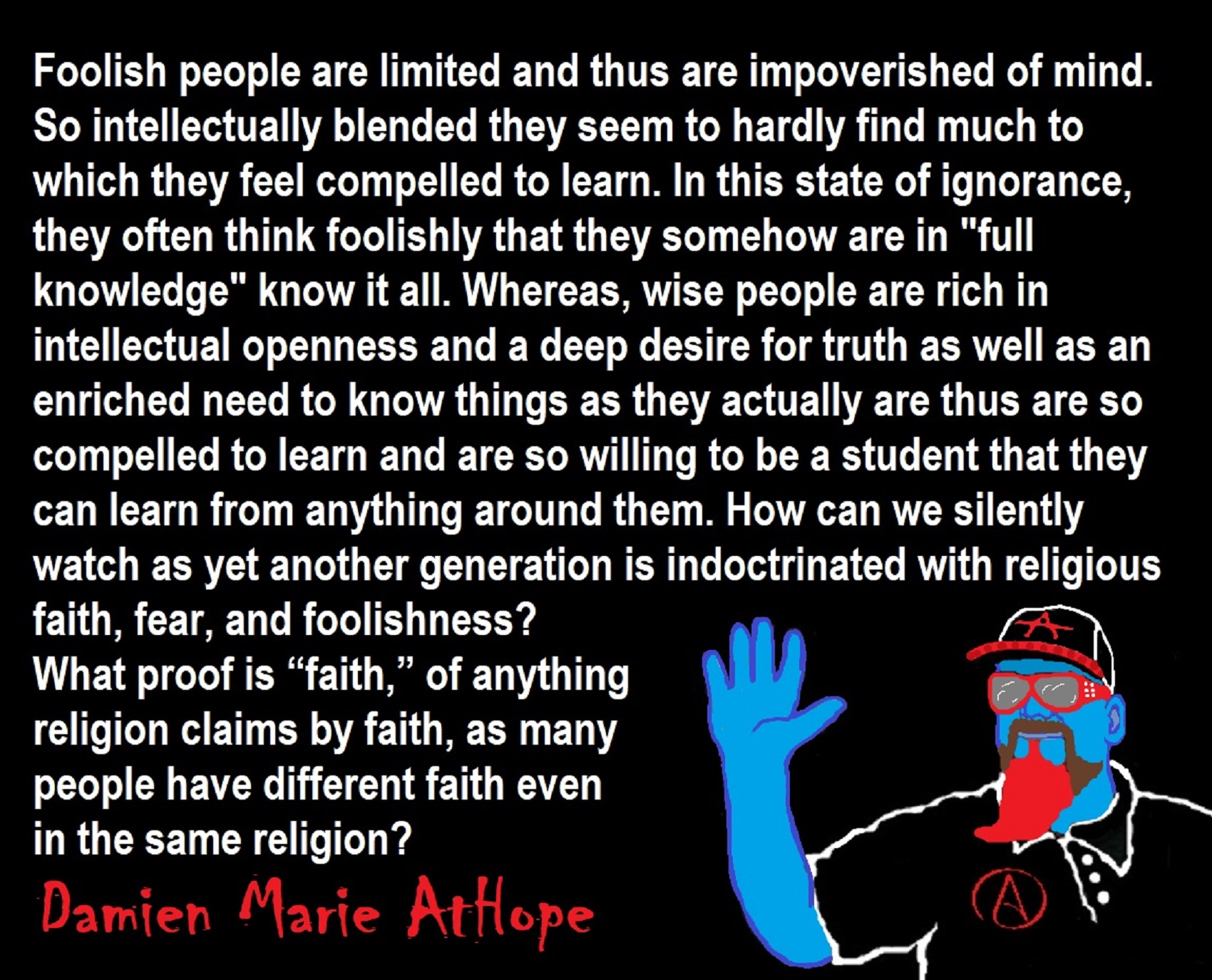
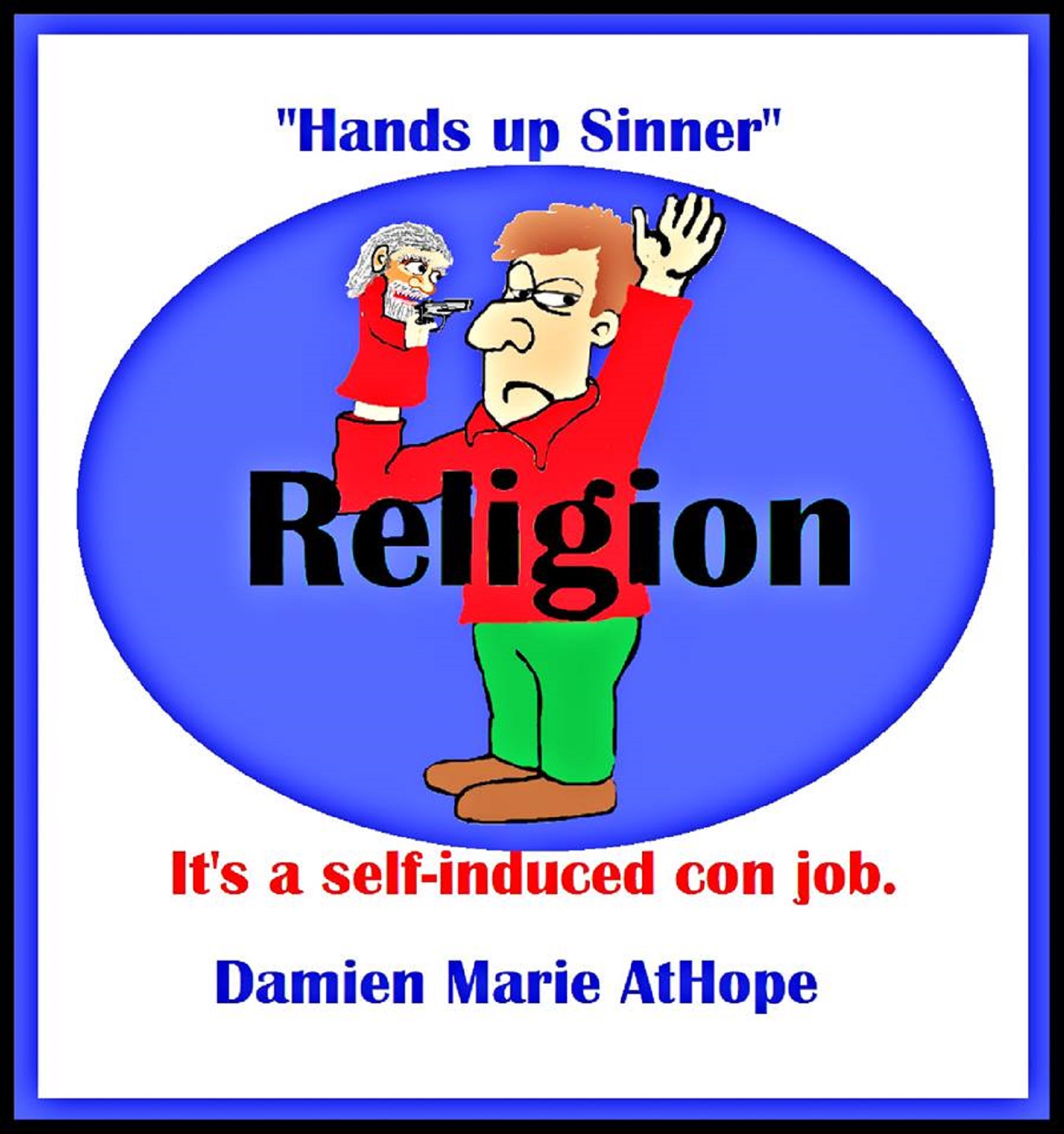
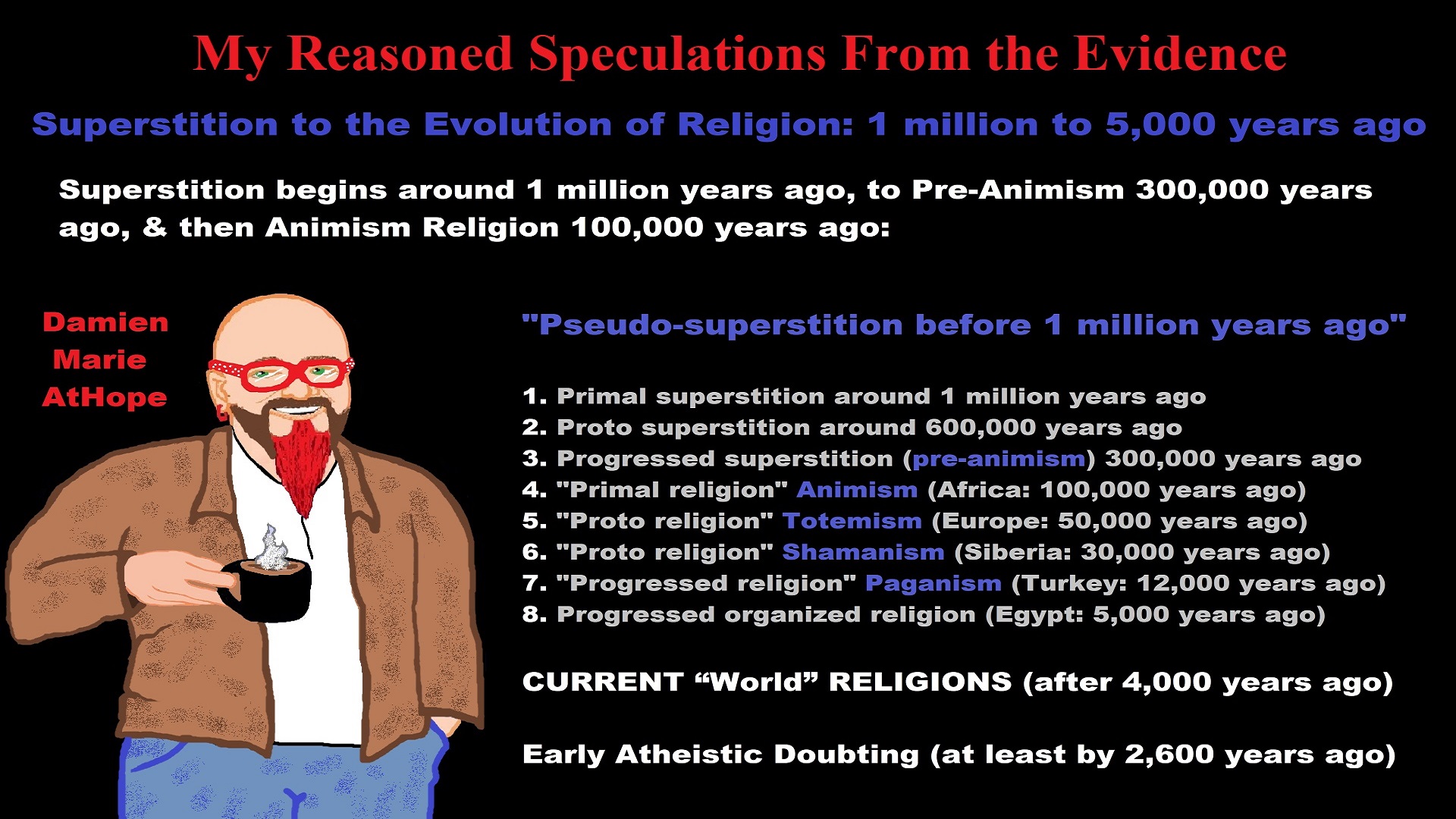
My thoughts on Religion Evolution with external links for more info:
- (Pre-Animism Africa mainly, but also Europe, and Asia at least 300,000 years ago), (Pre-Animism – Oxford Dictionaries)
- (Animism Africa around 100,000 years ago), (Animism – Britannica.com)
- (Totemism Europe around 50,000 years ago), (Totemism – Anthropology)
- (Shamanism Siberia around 30,000 years ago), (Shamanism – Britannica.com)
- (Paganism Turkey around 12,000 years ago), (Paganism – BBC Religion)
- (Progressed Organized Religion “Institutional Religion” Egypt around 5,000 years ago), (Ancient Egyptian Religion – Britannica.com)
- (CURRENT “World” RELIGIONS after 4,000 years ago) (Origin of Major Religions – Sacred Texts)
- (Early Atheistic Doubting at least by 2,600 years ago) (History of Atheism – Wikipedia)
“Religion is an Evolved Product” and Yes, Religion is Like Fear Given Wings…
Atheists talk about gods and religions for the same reason doctors talk about cancer, they are looking for a cure, or a firefighter talks about fires because they burn people and they care to stop them. We atheists too often feel a need to help the victims of mental slavery, held in the bondage that is the false beliefs of gods and the conspiracy theories of reality found in religions.
Understanding Religion Evolution:
- Pre-Animism (at least 300,000 years ago)
- Animism (Africa: 100,000 years ago)
- Totemism (Europe: 50,000 years ago)
- Shamanism (Siberia: 30,000 years ago)
- Paganism (Turkey: 12,000 years ago)
- Progressed organized religion (Egypt: 5,000 years ago), (Egypt, the First Dynasty 5,150 years ago)
- CURRENT “World” RELIGIONS (after 4,000 years ago)
- Early Atheistic Doubting (at least by 2,600 years ago)
“An Archaeological/Anthropological Understanding of Religion Evolution”
It seems ancient peoples had to survived amazing threats in a “dangerous universe (by superstition perceived as good and evil),” and human “immorality or imperfection of the soul” which was thought to affect the still living, leading to ancestor worship. This ancestor worship presumably led to the belief in supernatural beings, and then some of these were turned into the belief in gods. This feeble myth called gods were just a human conceived “made from nothing into something over and over, changing, again and again, taking on more as they evolve, all the while they are thought to be special,” but it is just supernatural animistic spirit-belief perceived as sacred.
Quick Evolution of Religion?
Pre-Animism (at least 300,000 years ago) pre-religion is a beginning that evolves into later Animism. So, Religion as we think of it, to me, all starts in a general way with Animism (Africa: 100,000 years ago) (theoretical belief in supernatural powers/spirits), then this is physically expressed in or with Totemism (Europe: 50,000 years ago) (theoretical belief in mythical relationship with powers/spirits through a totem item), which then enlists a full-time specific person to do this worship and believed interacting Shamanism (Siberia/Russia: 30,000 years ago) (theoretical belief in access and influence with spirits through ritual), and then there is the further employment of myths and gods added to all the above giving you Paganism (Turkey: 12,000 years ago) (often a lot more nature-based than most current top world religions, thus hinting to their close link to more ancient religious thinking it stems from). My hypothesis is expressed with an explanation of the building of a theatrical house (modern religions development). Progressed organized religion (Egypt: 5,000 years ago) with CURRENT “World” RELIGIONS (after 4,000 years ago).
Historically, in large city-state societies (such as Egypt or Iraq) starting around 5,000 years ago culminated to make religion something kind of new, a sociocultural-governmental-religious monarchy, where all or at least many of the people of such large city-state societies seem familiar with and committed to the existence of “religion” as the integrated life identity package of control dynamics with a fixed closed magical doctrine, but this juggernaut integrated religion identity package of Dogmatic-Propaganda certainly did not exist or if developed to an extent it was highly limited in most smaller prehistoric societies as they seem to lack most of the strong control dynamics with a fixed closed magical doctrine (magical beliefs could be at times be added or removed). Many people just want to see developed religious dynamics everywhere even if it is not. Instead, all that is found is largely fragments until the domestication of religion.
Religions, as we think of them today, are a new fad, even if they go back to around 6,000 years in the timeline of human existence, this amounts to almost nothing when seen in the long slow evolution of religion at least around 70,000 years ago with one of the oldest ritual worship. Stone Snake of South Africa: “first human worship” 70,000 years ago. This message of how religion and gods among them are clearly a man-made thing that was developed slowly as it was invented and then implemented peace by peace discrediting them all. Which seems to be a simple point some are just not grasping how devastating to any claims of truth when we can see the lie clearly in the archeological sites.
I wish people fought as hard for the actual values as they fight for the group/clan names political or otherwise they think support values. Every amount spent on war is theft to children in need of food or the homeless kept from shelter.
Here are several of my blog posts on history:
- To Find Truth You Must First Look
- (Magdalenian/Iberomaurusian) Connections to the First Paganists of the early Neolithic Near East Dating from around 17,000 to 12,000 Years Ago
- Natufians: an Ancient People at the Origins of Agriculture and Sedentary Life
- Possible Clan Leader/Special “MALE” Ancestor Totem Poles At Least 13,500 years ago?
- Jewish People with DNA at least 13,200 years old, Judaism, and the Origins of Some of its Ideas
- Baltic Reindeer Hunters: Swiderian, Lyngby, Ahrensburgian, and Krasnosillya cultures 12,020 to 11,020 years ago are evidence of powerful migratory waves during the last 13,000 years and a genetic link to Saami and the Finno-Ugric peoples.
- The Rise of Inequality: patriarchy and state hierarchy inequality
- Fertile Crescent 12,500 – 9,500 Years Ago: fertility and death cult belief system?
- 12,400 – 11,700 Years Ago – Kortik Tepe (Turkey) Pre/early-Agriculture Cultic Ritualism
- Ritualistic Bird Symbolism at Gobekli Tepe and its “Ancestor Cult”
- Male-Homosexual (female-like) / Trans-woman (female) Seated Figurine from Gobekli Tepe
- Could a 12,000-year-old Bull Geoglyph at Göbekli Tepe relate to older Bull and Female Art 25,000 years ago and Later Goddess and the Bull cults like Catal Huyuk?
- Sedentism and the Creation of goddesses around 12,000 years ago as well as male gods after 7,000 years ago.
- Alcohol, where Agriculture and Religion Become one? Such as Gobekli Tepe’s Ritualistic use of Grain as Food and Ritual Drink
- Neolithic Ritual Sites with T-Pillars and other Cultic Pillars
- Paganism: Goddesses around 12,000 years ago then Male Gods after 7,000 years ago
- First Patriarchy: Split of Women’s Status around 12,000 years ago & First Hierarchy: fall of Women’s Status around 5,000 years ago.
- Natufians: an Ancient People at the Origins of Agriculture and Sedentary Life
- J DNA and the Spread of Agricultural Religion (paganism)
- Paganism: an approximately 12,000-year-old belief system
- Paganism 12,000 years old: related to “Anarchism and Socialism” (Pre-Capitalism)
- Shaman burial in Israel 12,000 years ago and the Shamanism Phenomena
- Need to Mythicized: gods and goddesses
- 12,000 – 7,000 Years Ago – Paleo-Indian Culture (The Americas)
- 12,000 – 2,000 Years Ago – Indigenous-Scandinavians (Nordic)
- Norse did not wear helmets with horns?
- Pre-Pottery Neolithic Skull Cult around 11,500 to 8,400 Years Ago?
- 10,400 – 10,100 Years Ago, in Turkey the Nevail Cori Religious Settlement
- 9,000-6,500 Years Old Submerged Pre-Pottery/Pottery Neolithic Ritual Settlements off Israel’s Coast
- Catal Huyuk “first religious designed city” around 9,500 to 7,700 years ago (Turkey)
- Cultic Hunting at Catal Huyuk “first religious designed city”
- Special Items and Art as well as Special Elite Burials at Catal Huyuk
- New Rituals and Violence with the appearance of Pottery and People?
- Haplogroup N and its related Uralic Languages and Cultures
- Ainu people, Sámi people, Native Americans, the Ancient North Eurasians, and Paganistic-Shamanism with Totemism
- Ideas, Technology and People from Turkey, Europe, to China and Back again 9,000 to 5,000 years ago?
- First Pottery of Europe and the Related Cultures
- 9,000 years old Neolithic Artifacts Judean Desert and Hills Israel
- 9,000-7,000 years-old Sex and Death Rituals: Cult Sites in Israel, Jordan, and the Sinai
- 9,000-8500 year old Horned Female shaman Bad Dürrenberg Germany
- Neolithic Jewelry and the Spread of Farming in Europe Emerging out of West Turkey
- 8,600-year-old Tortoise Shells in Neolithic graves in central China have Early Writing and Shamanism
- Swing of the Mace: the rise of Elite, Forced Authority, and Inequality begin to Emerge 8,500 years ago?
- Migrations and Changing Europeans Beginning around 8,000 Years Ago
- My “Steppe-Anatolian-Kurgan hypothesis” 8,000/7,000 years ago
- Around 8,000-year-old Shared Idea of the Mistress of Animals, “Ritual” Motif
- Pre-Columbian Red-Paint (red ochre) Maritime Archaic Culture 8,000-3,000 years ago
- 7,522-6,522 years ago Linear Pottery culture which I think relates to Arcane Capitalism’s origins
- Arcane Capitalism: Primitive socialism, Primitive capital, Private ownership, Means of production, Market capitalism, Class discrimination, and Petite bourgeoisie (smaller capitalists)
- 7,500-4,750 years old Ritualistic Cucuteni-Trypillian culture of Moldova, Romania, and Ukraine
- Roots of a changing early society 7,200-6,700 years ago Jordan and Israel
- Agriculture religion (Paganism) with farming reached Britain between about 7,000 to 6,500 or so years ago and seemingly expressed in things like Western Europe’s Long Barrows
- My Thoughts on Possible Migrations of “R” DNA and Proto-Indo-European?
- “Millet” Spreading from China 7,022 years ago to Europe and related Language may have Spread with it leading to Proto-Indo-European
- Proto-Indo-European (PIE), ancestor of Indo-European languages: DNA, Society, Language, and Mythology
- The Dnieper–Donets culture and Asian varieties of Millet from China to the Black Sea region of Europe by 7,022 years ago
- Kurgan 6,000 years ago/dolmens 7,000 years ago: funeral, ritual, and other?
- 7,020 to 6,020-year-old Proto-Indo-European Homeland of Urheimat or proposed home of their Language and Religion
- Ancient Megaliths: Kurgan, Ziggurat, Pyramid, Menhir, Trilithon, Dolman, Kromlech, and Kromlech of Trilithons
- The Mytheme of Ancient North Eurasian Sacred-Dog belief and similar motifs are found in Indo-European, Native American, and Siberian comparative mythology
- Elite Power Accumulation: Ancient Trade, Tokens, Writing, Wealth, Merchants, and Priest-Kings
- Sacred Mounds, Mountains, Kurgans, and Pyramids may hold deep connections?
- Between 7,000-5,000 Years ago, rise of unequal hierarchy elite, leading to a “birth of the State” or worship of power, strong new sexism, oppression of non-elites, and the fall of Women’s equal status
- Paganism 7,000-5,000 years old: related to “Anarchism and Socialism” (Capitalism) (World War 0) Elite & their slaves
- Hell and Underworld mythologies starting maybe as far back as 7,000 to 5,000 years ago with the Proto-Indo-Europeans?
- The First Expression of the Male God around 7,000 years ago?
- White (light complexion skin) Bigotry and Sexism started 7,000 years ago?
- Around 7,000-year-old Shared Idea of the Divine Bird (Tutelary and/or Trickster spirit/deity), “Ritual” Motif
- Nekhbet an Ancient Egyptian Vulture Goddess and Tutelary Deity
- 6,720 to 4,920 years old Ritualistic Hongshan Culture of Inner Mongolia with 5,000-year-old Pyramid Mounds and Temples
- First proto-king in the Balkans, Varna culture around 6,500 years ago?
- 6,500–5,800 years ago in Israel Late Chalcolithic (Copper Age) Period in the Southern Levant Seems to Express Northern Levant Migrations, Cultural and Religious Transfer
- KING OF BEASTS: Master of Animals “Ritual” Motif, around 6,000 years old or older…
- Around 6000-year-old Shared Idea of the Solid Wheel & the Spoked Wheel-Shaped Ritual Motif
- “The Ghassulian Star,” a mysterious 6,000-year-old mural from Jordan; a Proto-Star of Ishtar, Star of Inanna or Star of Venus?
- Religious/Ritual Ideas, including goddesses and gods as well as ritual mounds or pyramids from Northeastern Asia at least 6,000 years old, seemingly filtering to Iran, Iraq, the Mediterranean, Europe, Egypt, and the Americas?
- Maykop (5,720–5,020 years ago) Caucasus region Bronze Age culture-related to Copper Age farmers from the south, influenced by the Ubaid period and Leyla-Tepe culture, as well as influencing the Kura-Araxes culture
- 5-600-year-old Tomb, Mummy, and First Bearded Male Figurine in a Grave
- Kura-Araxes Cultural 5,520 to 4,470 years old DNA traces to the Canaanites, Arabs, and Jews
- Minoan/Cretan (Keftiu) Civilization and Religion around 5,520 to 3,120 years ago
- Evolution Of Science at least by 5,500 years ago
- 5,500 Years old birth of the State, the rise of Hierarchy, and the fall of Women’s status
- “Jiroft culture” 5,100 – 4,200 years ago and the History of Iran
- Stonehenge: Paganistic Burial and Astrological Ritual Complex, England (5,100-3,600 years ago)
- Around 5,000-year-old Shared Idea of the “Tree of Life” Ritual Motif
- Complex rituals for elite, seen from China to Egypt, at least by 5,000 years ago
- Around 5,000 years ago: “Birth of the State” where Religion gets Military Power and Influence
- The Center of the World “Axis Mundi” and/or “Sacred Mountains” Mythology Could Relate to the Altai Mountains, Heart of the Steppe
- Progressed organized religion starts, an approximately 5,000-year-old belief system
- China’s Civilization between 5,000-3,000 years ago, was a time of war and class struggle, violent transition from free clans to a Slave or Elite society
- Origin of Logics is Naturalistic Observation at least by around 5,000 years ago.
- Paganism 5,000 years old: progressed organized religion and the state: related to “Anarchism and Socialism” (Kings and the Rise of the State)
- Ziggurats (multi-platform temples: 4,900 years old) to Pyramids (multi-platform tombs: 4,700 years old)
- Did a 4,520–4,420-year-old Volcano In Turkey Inspire the Bible God?
- Finland’s Horned Shaman and Pre-Horned-God at least 4,500 years ago?
- 4,000-year-Old Dolmens in Israel: A Connected Dolmen Religious Phenomenon?
- Creation myths: From chaos, Ex nihilo, Earth-diver, Emergence, World egg, and World parent
- Bronze Age “Ritual” connections of the Bell Beaker culture with the Corded Ware/Single Grave culture, which were related to the Yamnaya culture and Proto-Indo-European Languages/Religions
- Low Gods (Earth/ Tutelary deity), High Gods (Sky/Supreme deity), and Moralistic Gods (Deity enforcement/divine order)
- The exchange of people, ideas, and material-culture including, to me, the new god (Sky Father) and goddess (Earth Mother) religion between the Cucuteni-Trypillians and others which is then spread far and wide
- Koryaks: Indigenous People of the Russian Far East and Big Raven myths also found in Tlingit, Haida, Tsimshian, and other Indigenous People of North America
- 42 Principles Of Maat (Egyptian Goddess of the justice) around 4,400 years ago, 2000 Years Before Ten Commandments
- “Happy Easter” Well Happy Eostre/Ishter
- 4,320-3,820 years old “Shimao” (North China) site with Totemistic-Shamanistic Paganism and a Stepped Pyramid
- 4,250 to 3,400 Year old Stonehenge from Russia: Arkaim?
- 4,100-year-old beaker with medicinal & flowering plants in a grave of a woman in Scotland
- Early European Farmer ancestry, Kelif el Boroud people with the Cardial Ware culture, and the Bell Beaker culture Paganists too, spread into North Africa, then to the Canary Islands off West Africa
- Flood Accounts: Gilgamesh epic (4,100 years ago) Noah in Genesis (2,600 years ago)
- Paganism 4,000 years old: related to “Anarchism and Socialism” (First Moralistic gods, then the Origin time of Monotheism)
- When was the beginning: TIMELINE OF CURRENT RELIGIONS, which start around 4,000 years ago.
- Early Religions Thought to Express Proto-Monotheistic Systems around 4,000 years ago
- Kultepe? An archaeological site with a 4,000 years old women’s rights document.
- Single God Religions (Monotheism) = “Man-o-theism” started around 4,000 years ago with the Great Sky Spirit/God Tiān (天)?
- Confucianism’s Tiān (Shangdi god 4,000 years old): Supernaturalism, Pantheism or Theism?
- Yes, Your Male God is Ridiculous
- Mythology, a Lunar Deity is a Goddess or God of the Moon
- Sacred Land, Hills, and Mountains: Sami Mythology (Paganistic Shamanism)
- Horse Worship/Sacrifice: mythical union of Ruling Elite/Kingship and the Horse
- The Amorite/Amurru people’s God Amurru “Lord of the Steppe”, relates to the Origins of the Bible God?
- Bronze Age Exotic Trade Routes Spread Quite Far as well as Spread Religious Ideas with Them
- Sami and the Northern Indigenous Peoples Landscape, Language, and its Connection to Religion
- Prototype of Ancient Analemmatic Sundials around 3,900-3,150 years ago and a Possible Solar Connection to gods?
- Judaism is around 3,450 or 3,250 years old. (“Paleo-Hebrew” 3,000 years ago and Torah 2,500 years ago)
- The Weakening of Ancient Trade and the Strengthening of Religions around 3000 years ago?
- Are you aware that there are religions that worship women gods, explain now religion tears women down?
- Animistic, Totemistic, and Paganistic Superstition Origins of bible god and the bible’s Religion.
- Myths and Folklore: “Trickster gods and goddesses”
- Jews, Judaism, and the Origins of Some of its Ideas
- An Old Branch of Religion Still Giving Fruit: Sacred Trees
- Dating the BIBLE: naming names and telling times (written less than 3,000 years ago, provable to 2,200 years ago)
- Did a Volcano Inspire the bible god?
- Dené–Yeniseian language, Old Copper Complex, and Pre-Columbian Mound Builders?
- No “dinosaurs and humans didn’t exist together just because some think they are in the bible itself”
- Sacred Shit and Sacred Animals?
- Everyone Killed in the Bible Flood? “Nephilim” (giants)?
- Hey, Damien dude, I have a question for you regarding “the bible” Exodus.
- Archaeology Disproves the Bible
- Bible Battle, Just More, Bible Babble
- The Jericho Conquest lie?
- Canaanites and Israelites?
- Accurate Account on how did Christianity Began?
- Let’s talk about Christianity.
- So the 10 commandments isn’t anything to go by either right?
- Misinformed christian
- Debunking Jesus?
- Paulism vs Jesus
- Ok, you seem confused so let’s talk about Buddhism.
- Unacknowledged Buddhism: Gods, Savior, Demons, Rebirth, Heavens, Hells, and Terrorism
- His Foolishness The Dalai Lama
- Yin and Yang is sexist with an ORIGIN around 2,300 years ago?
- I Believe Archaeology, not Myths & Why Not, as the Religious Myths Already Violate Reason!
- Archaeological, Scientific, & Philosophic evidence shows the god myth is man-made nonsense.
- Aquatic Ape Theory/Hypothesis? As Always, Just Pseudoscience.
- Ancient Aliens Conspiracy Theorists are Pseudohistorians
- The Pseudohistoric and Pseudoscientific claims about “Bakoni Ruins” of South Africa
- Why do people think Religion is much more than supernaturalism and superstitionism?
- Religion is an Evolved Product
- Was the Value of Ancient Women Different?
- 1000 to 1100 CE, human sacrifice Cahokia Mounds a pre-Columbian Native American site
- Feminist atheists as far back as the 1800s?
- Promoting Religion as Real is Mentally Harmful to a Flourishing Humanity
- Screw All Religions and Their Toxic lies, they are all fraud
- Forget Religions’ Unfounded Myths, I Have Substantiated “Archaeology Facts.”
- Religion Dispersal throughout the World
- I Hate Religion Just as I Hate all Pseudoscience
- Exposing Scientology, Eckankar, Wicca and Other Nonsense?
- Main deity or religious belief systems
- Quit Trying to Invent Your God From the Scraps of Science.
- Archaeological, Scientific, & Philosophic evidence shows the god myth is man-made nonsense.
- Ancient Alien Conspiracy Theorists: Misunderstanding, Rhetoric, Misinformation, Fabrications, and Lies
- Misinformation, Distortion, and Pseudoscience in Talking with a Christian Creationist
- Judging the Lack of Goodness in Gods, Even the Norse God Odin
- Challenging the Belief in God-like Aliens and Gods in General
- A Challenge to Christian use of Torture Devices?
- Yes, Hinduism is a Religion
- Trump is One of the Most Reactionary Forces of Far-right Christian Extremism
- Was the Bull Head a Symbol of God? Yes!
- Primate Death Rituals
- Christian – “God and Christianity are objectively true”
- Australopithecus afarensis Death Ritual?
- You Claim Global Warming is a Hoax?
- Doubter of Science and Defamer of Atheists?
- I think that sounds like the Bible?
- History of the Antifa (“anti-fascist”) Movements
- Indianapolis Anti-Blasphemy Laws #Free Soheil Rally
- Damien, you repeat the golden rule in so many forms then you say religion is dogmatic?
- Science is a Trustable Methodology whereas Faith is not Trustable at all!
- Was I ever a believer, before I was an atheist?
- Atheists rise in reason
- Mistrust of science?
- Open to Talking About the Definition of ‘God’? But first, we address Faith.
- ‘United Monarchy’ full of splendor and power – Saul, David, and Solomon? Most likely not.
- Is there EXODUS ARCHAEOLOGY? The short answer is “no.”
- Lacking Proof of Bigfoots, Unicorns, and Gods is Just a Lack of Research?
- Religion and Politics: Faith Beliefs vs. Rational Thinking
- Hammer of Truth that lying pig RELIGION: challenged by an archaeologist
- “The Hammer of Truth” -ontology question- What do You Mean by That?
- Navigation of a bad argument: Ad Hominem vs. Attack
- Why is it Often Claimed that Gods have a Gender?
- Why are basically all monotheistic religions ones that have a male god?
- Shifting through the Claims in support of Faith
- Dear Mr. AtHope, The 20th Century is an Indictment of Secularism and a Failed Atheist Century
- An Understanding of the Worldwide Statistics and Dynamics of Terrorist Incidents and Suicide Attacks
- Intoxication and Evolution? Addressing and Assessing the “Stoned Ape” or “Drunken Monkey” Theories as Catalysts in Human Evolution
- Sacred Menstrual cloth? Inanna’s knot, Isis knot, and maybe Ma’at’s feather?
- Damien, why don’t the Hebrews accept the bible stories?
- Dealing with a Troll and Arguing Over Word Meaning
- Knowledge without Belief? Justified beliefs or disbeliefs worthy of Knowledge?
- Afrocentrism and African Religions
- Crecganford @crecganford offers history & stories of the people, places, gods, & culture
- Empiricism-Denier?
I am not an academic. I am a revolutionary that teaches in public, in places like social media, and in the streets. I am not a leader by some title given but from my commanding leadership style of simply to start teaching everywhere to everyone, all manner of positive education.

Hinduism around 3,700 to 3,500 years old. ref
Judaism around 3,450 or 3,250 years old. (The first writing in the bible was “Paleo-Hebrew” dated to around 3,000 years ago Khirbet Qeiyafa is the site of an ancient fortress city overlooking the Elah Valley. And many believe the religious Jewish texts were completed around 2,500) ref, ref
Judaism is around 3,450 or 3,250 years old. (“Paleo-Hebrew” 3,000 years ago and Torah 2,500 years ago)
“Judaism is an Abrahamic, its roots as an organized religion in the Middle East during the Bronze Age. Some scholars argue that modern Judaism evolved from Yahwism, the religion of ancient Israel and Judah, by the late 6th century BCE, and is thus considered to be one of the oldest monotheistic religions.” ref
“Yahwism is the name given by modern scholars to the religion of ancient Israel, essentially polytheistic, with a plethora of gods and goddesses. Heading the pantheon was Yahweh, the national god of the Israelite kingdoms of Israel and Judah, with his consort, the goddess Asherah; below them were second-tier gods and goddesses such as Baal, Shamash, Yarikh, Mot, and Astarte, all of whom had their own priests and prophets and numbered royalty among their devotees, and a third and fourth tier of minor divine beings, including the mal’ak, the messengers of the higher gods, who in later times became the angels of Judaism, Christianity and Islam. Yahweh, however, was not the ‘original’ god of Israel “Isra-El”; it is El, the head of the Canaanite pantheon, whose name forms the basis of the name “Israel”, and none of the Old Testament patriarchs, the tribes of Israel, the Judges, or the earliest monarchs, have a Yahwistic theophoric name (i.e., one incorporating the name of Yahweh).” ref
“El is a Northwest Semitic word meaning “god” or “deity“, or referring (as a proper name) to any one of multiple major ancient Near Eastern deities. A rarer form, ‘ila, represents the predicate form in Old Akkadian and in Amorite. The word is derived from the Proto-Semitic *ʔil-, meaning “god”. Specific deities known as ‘El or ‘Il include the supreme god of the ancient Canaanite religion and the supreme god of East Semitic speakers in Mesopotamia’s Early Dynastic Period. ʼĒl is listed at the head of many pantheons. In some Canaanite and Ugaritic sources, ʼĒl played a role as father of the gods, of creation, or both. For example, in the Ugaritic texts, ʾil mlk is understood to mean “ʼĒl the King” but ʾil hd as “the god Hadad“. The Semitic root ʾlh (Arabic ʾilāh, Aramaic ʾAlāh, ʾElāh, Hebrew ʾelōah) may be ʾl with a parasitic h, and ʾl may be an abbreviated form of ʾlh. In Ugaritic the plural form meaning “gods” is ʾilhm, equivalent to Hebrew ʾelōhîm “powers”. In the Hebrew texts this word is interpreted as being semantically singular for “god” by biblical commentators. However the documentary hypothesis for the Old Testament (corresponds to the Jewish Torah) developed originally in the 1870s, identifies these that different authors – the Jahwist, Elohist, Deuteronomist, and the Priestly source – were responsible for editing stories from a polytheistic religion into those of a monotheistic religion. Inconsistencies that arise between monotheism and polytheism in the texts are reflective of this hypothesis.” ref
Jainism around 2,599 – 2,527 years old. ref
Confucianism around 2,600 – 2,551 years old. ref
Buddhism around 2,563/2,480 – 2,483/2,400 years old. ref
Christianity around 2,o00 years old. ref
Shinto around 1,305 years old. ref
Islam around 1407–1385 years old. ref

“Theists, there has to be a god, as something can not come from nothing.”
Well, thus something (unknown) happened and then there was something. This does not tell us what the something that may have been involved with something coming from nothing. A supposed first cause, thus something (unknown) happened and then there was something is not an open invitation to claim it as known, neither is it justified to call or label such an unknown as anything, especially an unsubstantiated magical thinking belief born of mythology and religious storytelling.

While hallucinogens are associated with shamanism, it is alcohol that is associated with paganism.
The Atheist-Humanist-Leftist Revolutionaries Shows in the prehistory series:
Show two: Pre-animism 300,000 years old and animism 100,000 years old: related to “Anarchism and Socialism”
Show tree: Totemism 50,000 years old: related to “Anarchism and Socialism”
Show four: Shamanism 30,000 years old: related to “Anarchism and Socialism”
Show five: Paganism 12,000 years old: related to “Anarchism and Socialism”
Show six: Emergence of hierarchy, sexism, slavery, and the new male god dominance: Paganism 7,000-5,000 years old: related to “Anarchism and Socialism” (Capitalism) (World War 0) Elite and their slaves!
Prehistory: related to “Anarchism and Socialism” the division of labor, power, rights, and recourses: VIDEO
Pre-animism 300,000 years old and animism 100,000 years old: related to “Anarchism and Socialism”: VIDEO
Totemism 50,000 years old: related to “Anarchism and Socialism”: VIDEO
Shamanism 30,000 years old: related to “Anarchism and Socialism”: VIDEO
Paganism 12,000 years old: related to “Anarchism and Socialism” (Pre-Capitalism): VIDEO
Paganism 7,000-5,000 years old: related to “Anarchism and Socialism” (Capitalism) (World War 0) Elite and their slaves: VIEDO
Paganism 5,000 years old: progressed organized religion and the state: related to “Anarchism and Socialism” (Kings and the Rise of the State): VIEDO
Paganism 4,000 years old: related to “Anarchism and Socialism” (First Moralistic gods, then the Origin time of Monotheism): VIEDO
I do not hate simply because I challenge and expose myths or lies any more than others being thought of as loving simply because of the protection and hiding from challenge their favored myths or lies.
The truth is best championed in the sunlight of challenge.
An archaeologist once said to me “Damien religion and culture are very different”
My response, So are you saying that was always that way, such as would you say Native Americans’ cultures are separate from their religions? And do you think it always was the way you believe?
I had said that religion was a cultural product. That is still how I see it and there are other archaeologists that think close to me as well. Gods too are the myths of cultures that did not understand science or the world around them, seeing magic/supernatural everywhere.
I personally think there is a goddess and not enough evidence to support a male god at Çatalhöyük but if there was both a male and female god and goddess then I know the kind of gods they were like Proto-Indo-European mythology.
This series idea was addressed in, Anarchist Teaching as Free Public Education or Free Education in the Public: VIDEO
Our 12 video series: Organized Oppression: Mesopotamian State Force and the Politics of power (9,000-4,000 years ago), is adapted from: The Complete and Concise History of the Sumerians and Early Bronze Age Mesopotamia (7000-2000 BC): https://www.youtube.com/watch?v=szFjxmY7jQA by “History with Cy“
Show #1: Mesopotamian State Force and the Politics of Power (Samarra, Halaf, Ubaid)
Show #2: Mesopotamian State Force and the Politics of Power
Show #3: Mesopotamian State Force and the Politics of Power (Uruk and the First Cities)
Show #4: Mesopotamian State Force and the Politics of Power (First Kings)
Show #5: Mesopotamian State Force and the Politics of Power (Early Dynastic Period)
Show #6: Mesopotamian State Force and the Politics of Power
Show #7: Mesopotamian State Force and the Politics of Power (Sargon and Akkadian Rule)
Show #9: Mesopotamian State Force and the Politics of Power (Gudea of Lagash and Utu-hegal)
Show #12: Mesopotamian State Force and the Politics of Power (Aftermath and Legacy of Sumer)

The “Atheist-Humanist-Leftist Revolutionaries”
Cory Johnston ☭ Ⓐ Atheist Leftist @Skepticallefty & I (Damien Marie AtHope) @AthopeMarie (my YouTube & related blog) are working jointly in atheist, antitheist, antireligionist, antifascist, anarchist, socialist, and humanist endeavors in our videos together, generally, every other Saturday.
Why Does Power Bring Responsibility?
Think, how often is it the powerless that start wars, oppress others, or commit genocide? So, I guess the question is to us all, to ask, how can power not carry responsibility in a humanity concept? I know I see the deep ethical responsibility that if there is power their must be a humanistic responsibility of ethical and empathic stewardship of that power. Will I be brave enough to be kind? Will I possess enough courage to be compassionate? Will my valor reach its height of empathy? I as everyone, earns our justified respect by our actions, that are good, ethical, just, protecting, and kind. Do I have enough self-respect to put my love for humanity’s flushing, over being brought down by some of its bad actors? May we all be the ones doing good actions in the world, to help human flourishing.
I create the world I want to live in, striving for flourishing. Which is not a place but a positive potential involvement and promotion; a life of humanist goal precision. To master oneself, also means mastering positive prosocial behaviors needed for human flourishing. I may have lost a god myth as an atheist, but I am happy to tell you, my friend, it is exactly because of that, leaving the mental terrorizer, god belief, that I truly regained my connected ethical as well as kind humanity.
Cory and I will talk about prehistory and theism, addressing the relevance to atheism, anarchism, and socialism.
At the same time as the rise of the male god, 7,000 years ago, there was also the very time there was the rise of violence, war, and clans to kingdoms, then empires, then states. It is all connected back to 7,000 years ago, and it moved across the world.
Cory Johnston: https://damienmarieathope.com/2021/04/cory-johnston-mind-of-a-skeptical-leftist/?v=32aec8db952d
The Mind of a Skeptical Leftist (YouTube)
Cory Johnston: Mind of a Skeptical Leftist @Skepticallefty
The Mind of a Skeptical Leftist By Cory Johnston: “Promoting critical thinking, social justice, and left-wing politics by covering current events and talking to a variety of people. Cory Johnston has been thoughtfully talking to people and attempting to promote critical thinking, social justice, and left-wing politics.” http://anchor.fm/skepticalleft
Cory needs our support. We rise by helping each other.
Cory Johnston ☭ Ⓐ @Skepticallefty Evidence-based atheist leftist (he/him) Producer, host, and co-host of 4 podcasts @skeptarchy @skpoliticspod and @AthopeMarie
Damien Marie AtHope (“At Hope”) Axiological Atheist, Anti-theist, Anti-religionist, Secular Humanist. Rationalist, Writer, Artist, Poet, Philosopher, Advocate, Activist, Psychology, and Armchair Archaeology/Anthropology/Historian.
Damien is interested in: Freedom, Liberty, Justice, Equality, Ethics, Humanism, Science, Atheism, Antiteism, Antireligionism, Ignosticism, Left-Libertarianism, Anarchism, Socialism, Mutualism, Axiology, Metaphysics, LGBTQI, Philosophy, Advocacy, Activism, Mental Health, Psychology, Archaeology, Social Work, Sexual Rights, Marriage Rights, Woman’s Rights, Gender Rights, Child Rights, Secular Rights, Race Equality, Ageism/Disability Equality, Etc. And a far-leftist, “Anarcho-Humanist.”
I am not a good fit in the atheist movement that is mostly pro-capitalist, I am anti-capitalist. Mostly pro-skeptic, I am a rationalist not valuing skepticism. Mostly pro-agnostic, I am anti-agnostic. Mostly limited to anti-Abrahamic religions, I am an anti-religionist.
To me, the “male god” seems to have either emerged or become prominent around 7,000 years ago, whereas the now favored monotheism “male god” is more like 4,000 years ago or so. To me, the “female goddess” seems to have either emerged or become prominent around 11,000-10,000 years ago or so, losing the majority of its once prominence around 2,000 years ago due largely to the now favored monotheism “male god” that grow in prominence after 4,000 years ago or so.
My Thought on the Evolution of Gods?
Animal protector deities from old totems/spirit animal beliefs come first to me, 13,000/12,000 years ago, then women as deities 11,000/10,000 years ago, then male gods around 7,000/8,000 years ago. Moralistic gods around 5,000/4,000 years ago, and monotheistic gods around 4,000/3,000 years ago.
To me, animal gods were likely first related to totemism animals around 13,000 to 12,000 years ago or older. Female as goddesses was next to me, 11,000 to 10,000 years ago or so with the emergence of agriculture. Then male gods come about 8,000 to 7,000 years ago with clan wars. Many monotheism-themed religions started in henotheism, emerging out of polytheism/paganism.

Damien Marie AtHope (Said as “At” “Hope”)/(Autodidact Polymath but not good at math):
Axiological Atheist, Anti-theist, Anti-religionist, Secular Humanist, Rationalist, Writer, Artist, Jeweler, Poet, “autodidact” Philosopher, schooled in Psychology, and “autodidact” Armchair Archaeology/Anthropology/Pre-Historian (Knowledgeable in the range of: 1 million to 5,000/4,000 years ago). I am an anarchist socialist politically. Reasons for or Types of Atheism
My Website, My Blog, & Short-writing or Quotes, My YouTube, Twitter: @AthopeMarie, and My Email: damien.marie.athope@gmail.com


